#situations at the end of their shared narrative
Note
In your last ask, you mentioned misgivings with Book 10's ending, and especially how it pertains to Winter. I absolutely agree, and I know why, but I wanna hear your thoughts on it, too: What's up with Book 10?

The following is a (very long) examination of my personal feelings with regards to the WoF second story arc finale. While it is based on what is in the text, this analysis will be interpretive and fill in blanks with my own thoughts. Keep that in mind.
Hahhhh... okay. Since mentioning it in my last post I’ve gotten several requests to talk about my feelings regarding the second arc finale. There’s probably no way around it then.
If you haven’t read that last post (it was admittedly very long, and so will this one be), I talked briefly about why I didn’t like that part of the story. I have to warn you now, this will likely be the most negative and dour post in the history of this blog. In a few parts it will sound like I hate Wings of Fire, and I want to say now, while I still have the chance, that I don’t. I love this series, thinking about its setting and characters brings me joy.
I also—very emphatically—want to make it clear that I have no ill will against Tui T. Sutherland. I’ve looked around other people’s stuff a bit and there are a huge number of posts wishing violence upon her or threatening her for doing things to her series that people don’t agree with. That is NOT what I am doing here, shit like that is NOT okay! While I will be critical of her choices, I still respect her effort of bringing this vibrant, wonderful world of dragons to all of us.
Also, obligatory last disclaimer: If you liked the finale, that is okay. You are valid for feeling that way. I’m here to share my point of view, not to demand people agree with everything I say. Just be warned that you most likely won’t enjoy what I have to say. If you don’t think you can handle that kind of criticism, this is your guilt-free opportunity to stop reading.
Otherwise, let's get into it.
CW: Discussion of parental abuse, depression, disease, and extreme acts of violence.
In defense of the finale
Before I start to systematically disassemble this narrative and get lost in a quagmire of negativity, let’s talk a bit about the circumstances that brought forth this part of the story. The plot of this arc was a mess from the moment animus magic was unshackled from the restrictions it had in the first arc, and from then on there was no longer any conceivable way to end this story in a clean way. Sutherland had created an invincible, unbeatable, omnipotent villain; he could read minds, see the future with perfect clarity, and anything he could imagine he could conjure into existence at any time with no cost to himself and no drawbacks. She was likely wracking her brain about how to resolve this impossible conundrum. What we got wasn’t good, but I believe nothing could have been. The foundation was rotting and by the fifth book it couldn’t bear the weight of the plot anymore.
The thing about animus magic in arc 2 is that it is so potent, so all-powerful, and so free of restraint that everyone who uses it also HAS to be a simpleton, or they would be able to break the plot immediately and become god. From the moment Darkstalker broke out of that mountain, he could have said “Any and all spells that are cast with the intention to harm me, interfere with my plans, or do something I don’t consent to will not work, from now on until forever”, and he would have instantly won. The strawberry would have fizzled out. The Darkstalker-blocking earrings would not have been created, and no one could have saved the Icewings. On the flipside, Turtle or Anemone could have said “I enchant the concept of animus magic itself to no longer obey Darkstalker”, and his threat would have been neutered. Point is, powers as potent and easy to use as this really need limitations, or they will quickly eat your plot alive.
I don’t envy the situation Sutherland was in at the time at all. If you’re an author, that kind of thing is a nightmare. It really is no wonder she decided to blow up animus magic for good in her next arc, even if I would have preferred it to get more healthy restrictions instead of killing it outright.
The Darkstalker age regression thing
Everyone has talked this part to death already, but if I am to write a thorough analysis of my feelings regarding this finale, I’m going to have to talk about it as well. I’m sorry if I end up repeating a lot of things you’ve already heard.
This final fate of Darkstalker, to have his memories wiped and be reset to an infant, is really uncomfortable. As far as I am aware, though correct me if I’m wrong, Sutherland said in an interview that she didn’t want Darkstalker to die because, in her view, he did not deserve to. We can debate here about the philosophical question of whether anyone is truly deserving of death, and the merits of “justice” and “punishment”, but in general, Wings of Fire did not seem to have any issues killing off its villains prior if they committed suitably terrible acts. That makes this moment stand out as noteworthy.
Who is Darkstalker then--and if we assume villains can be “deserving” and “not deserving” of death--what about him speaks in his favor, or against? The guy had a pretty crappy childhood, coming from a broken home (there is that inadequate parent theme again). He genuinely loved his sister and felt protective of her, and whenever he liked someone he wanted them to be happy and feel affirmed. The thing that Queen Diamond does to his mother is awful and he is justified in hating her for it. He is also portrayed as rather sympathetic in Moon Rising. When he asks Moon to find his scroll for him and not to leave him, he is not manipulating her, he is sincerely begging for her help. He is stuck somewhere underground, trapped in darkness, in a space so tiny that he can’t move. He remains that way for months, lonely and sad. If you just focus on these aspects, it’s easy to understand why he has so many fans who want him to see healthy and happy.
On the flipside, while he is dedicated to the happiness of his friends, he doesn’t always go for the most ethical way to achieve it. He tries to brainwash said friends without their consent whenever they exhibit behaviors he doesn’t like, or when he thinks he knows better and wants to “fix” them. He has very little regard for other people’s autonomy, lies to his loved ones with alarming frequency, and is unhealthily attached to the idea of power. Those things are certainly not good, but they are his character flaws. These are his demons; everyone has them and they make him a person. If this was all there was to it, he might still be a villain, but I’d argue he’d not be wholly irredeemable.
But there are things about him that take him beyond the pale. Things that go beyond the realm of just being misunderstood, or easily excusable.
He is possessive. He wants Clearsight and Fathom for himself, and for them to listen to him primarily. When Indigo makes it clear she doesn’t like him and cautions Fathom against trusting him, he deceives his friends and traps Indigo in a wood carving, just so he can isolate Fathom from his support network and manipulate him easier. He alters Clearsight’s mind to make her more agreeable and stop her from holding him accountable for his actions; while he thinks he loves her, he only loves an idealized version of her that is wholly devoted to and unquestioning of him. This is why, when he later forcibly overwrites Fierceteeth’s existence to recreate her (which is another horrific thing), he tries to excise the parts he finds undesirable to create a perfect version of his lover. But this caricature he has created in his head is not and can never be Clearsight, which frustrates his attempts.
He is vengeful. Not against people who have actually wronged him, like Queen Diamond. That would be questionable, but understandable. What makes this unacceptable is his frequent targeting of innocent people who just happen to be related to the person who wronged him in some esoteric way. He enchants a secret murder knife that kills random Icewings regardless of who they are or what they think about the Queen, just because the one who took his mother from him happened to share their tribe. He hates Turtle and wishes death upon him in Moon Rising just because he is a green Seawing, like Fathom was. And then there is the big one: He tries to kill all the Icewings who are alive in the present day, where Queen Diamond is long dead and none of them have ever even met her. Even his mother, who suffered from Diamond’s actions the most and has the most reason to hate her, is horrified and calls him out on that one.
And lastly, he is sadistic. He revels in torturing those he hates. He forces his father to disembowel himself, while the latter is fully aware and powerless to resist AND the man’s traumatized daughter is watching. Later he sends a magical plague to kill every single living Icewing sans one.
It should be noted that Darkstalker possesses virtually infinite magical power; whatever he declares, with very few exceptions, will happen. Even if he wanted them dead, he had the power to prevent unnecessary suffering. He could have said “Arctic, fall dead instantaneously”, or “Every Icewing will fall asleep and pass away peacefully,” but he didn’t. He wanted them to feel pain and pass away in the most wretched, agonizing ways he could imagine.
So what he chose to do instead is—and I want you to picture this for a moment—Darkstalker sat down, calmly, and said “Henceforth every living Icewing, excepting Prince Winter and those of hybrid blood, will fall ill with an incurable disease. This disease will cause heavy internal bleeding and make its victims cough up blood and waste away for a few days, followed by certain death.”
This spell does not discriminate with regards to who its victims are. The book glosses over the implications, but imagine the ramifications. Young children are notoriously frail, how many newborns got infected and died because of this? How many families were torn apart because they couldn’t get the magic earrings fast enough? Or accidentally got one earring less than there were family members and had to decide who has to die?
Most of the Icewings were physically cured by the earrings, but an experience like that sticks with you for the rest of your life. Somewhere surely, a dragonet watched as his mother put the earring on him and then slowly wasted away because she didn’t have one for herself.
It’s really easy to overlook how horrific this spell is because it isn’t shown or dwelt on. But the trauma, grief, and suffering it caused must have been immeasurable.
And none of those victims have ever even met the person Darkstalker wanted to get revenge on. None of those deaths meant anything to anyone.
The attempted death toll and scale of the calamity here puts even Scarlet to shame. The ones who come closest to it were Queen Battlewinner and Morrowseer with their attempted Rainwing extermination. All three of those died for what they did. Gives you some food for thought for sure.
Peacemaker’s burden
Despite just airing all of his dirty laundry and declaring him an irredeemable villain, I actually do have a lot of sympathy for Darkstalker still. His story is really sad. He was a child born with an amount of power that nobody should possess, and it corrupted him to the point where it destroyed his life before it began. His parents were always fighting and no matter how good his intentions were, he was unable to understand why he couldn’t hold on to his friends and relationship. He kept making mistakes, then made bigger mistakes to fix those, until his hands were covered in blood and he couldn’t stop anymore. My belief is that, after he wakes up in the present and realizes Clearsight is dead, he loses his reason for living and becomes completely lost in his grief.
Therefore, my opinion is that it would have been appropriate for him to die. If not to punish him, then to finally grant him reprieve from all that rage and pain, and let him rest. I think that would have been a dignified end.
But instead he got turned into a baby. ... And then they decided to magically erase his father’s blood from him? I don’t know what it is, but something about that Icewing erasure makes my skin crawl?
The thing that turns this baby twist from weird into highly unsettling is the context. Darkstalker’s mind is erased, then modified into a new person via animus magic. This is the technique a lot of this arc’s villains used to victimize Hailstorm, Queen Ruby, Peril, Kinkajou, Fierceteeth, and Winter. The same technique is now used again, by the heroes, which is a dangerous thing to have your protagonists do if you want them to remain morally upright.
It is also very reckless, because in almost all of these instances, animus mind alteration has been shown to be very unreliable. The spells seem to wear down over time and are susceptible to partial breaking upon encountering certain strong stimuli. Hailstorm—while trapped as Pyrite—seems to retain trace amounts of his former memories, which is why Pyrite is subconsciously drawn to Winter and clings to him all the time. Ruby is able to ignore half of her conditioning because her familial love for her son partially overpowers the magic. Qibli is just straight up able to reason his way out of it.
The thing to note here is that spells of this nature require a very meticulous approach; you can’t half-ass your reprogramming or the victim will just think their way past it. If you alter someone’s mind, the wording of the spell must be ironclad, lest you risk it wearing down over time and even break.
Luckily we have nothing to fear in that regard, because the spell that created Peacemaker was written by a Rainwing with a total of four days of literacy training. No one better mention the name Clearsight to the new baby Nightwing, or next month is going to be rather interesting.
But that’s just speculation on my part. Let’s assume that, somehow, this spell isn’t as unstable as all the others. Somehow Kinkajou threaded all the needles, and masterfully dodged every conceivable pitfall to pen the perfect incantation, despite having been illiterate just a few weeks prior. This one is built to last and Darkstalker is sealed away really thoroughly, for good.
That is still absolutely terrible and morally dubious, because now you have Peacemaker, who for all intents and purposes is a COMPLETELY innocent little kid, saddled with this huge burden of being the certifiable reincarnation of a genocidal ancient wizard. He’s gonna grow up thinking things like “Mommy gets real quiet whenever the topic of the Icewing tragedy is brought up,” and “Why does Auntie Moon look at me like that? One time she accidentally called me a weird name, who is Darkstalker?” “What is this ‘Clearsight’ name my mind-reading friends from the village found in Mommy’s mind?”
In a village that will be full of mind-readers soon, eventually the secret will come out, and Peacemaker is going to learn what was done to him. A huge, messy load of undeserved baggage was forced onto this completely separate, innocent entity. He will be devastated. Whether he then chooses to forgive them for this remains to be seen. To be honest, he would be well within his right not to, and turn resentful.
Poor kid.
Qibli’s callousness
I love Qibli, he is one of my favorite characters. This happens to be his book, and the fact that I fundamentally dislike half of it makes me rather sad. If anything, I hope this tells you that I’m not just hating on it for my personal amusement. I really wanted to like this. I tried to, and I couldn’t.
Qibli is really weird in this one, to be honest. He is suddenly made to be co-dependent on Moonwatcher, fawning over her every third paragraph, saying how much he loves her, how he is an incomplete and dysfunctional wreck without her, how it physically pains him to be apart from her, oh if only the stars would grant his wish and split the mountains apart so that he may fly to his princess, his muse, his goddess of ebony wit. It gets so old.
And it’s not Qibli. He never acted this clingy towards Moonwatcher. It’s more intense than even Winter gets about Moon, and Winter was actually depicted with a crush on her in book 6. Qibli was always just a supportive element, eager to befriend Moon but never desperate, like he is going to keel over if he is separated from his true love five minutes longer. These very frequent love declarations feel so forced coming out of him. It strikes me like it was just written in service of the love triangle. Maybe if we make him confess his love every four seconds readers will overlook the fact that they had no proper romantic build-up.
You might rightly accuse me of bias. I have previously admitted I am fond of Qibli/Winter as a romantic pairing, on the surface this seems like I am just not happy with my pet ship being blocked by Moonwatcher. But I assure you, I am actually pretty flexible and accommodating even towards pairings that contradict my preferences. I have no issues with Winter/Moonwatcher, for example, because the possibility was properly established and they have good romantic chemistry in Winter Turning. In theory, I would have no problem with Qibli/Moonwatcher either if it was ever set up as an interesting romantic dynamic. But to me, it seems like Qibli is written as a good, supportive friend to Moon for four books, only to pivot hard into “Moon moon moon moon moon moon swoon” at the last second, and it just reads to me as obnoxious.
I got distracted. This section is called “Qibli’s callousness”, and I haven’t even talked about the main part.
Qibli and Winter have excellent chemstry together, whether you read it as romantic or platonic—both of these interpretations have merit and are set up. They’re always the highlight of any scene they’re in. Throughout the story arc you get the impression that these two really get on each other’s nerves, but they bond and grow into really strong friends who bicker a lot but have each other’s backs when it counts.
Then there is a scene where Qibli casually tells Winter that he wouldn’t object if someone wanted to mind-control away some of Winter’s more objectionable traits.
This is genuinely a terrible thing to say to your friend. Like, it crosses a line and ceases to be harmless banter; you’re just telling them that there is something you hate about them so much that you wish they were someone else. Winter actually WAS mind-controlled earlier and felt (and proably still feels) guilty about having attacked Qibli in that state. And now Qibli says “Hey, I wouldn’t mind if someone did that to you again! Hue hue!”
It is awful, BUT I don’t necessarily object to Qibli saying this here. Qibli is in the middle of his character arc at this moment, so he is expected to be flawed. He is making a mistake by thoughtlessly telling Winter this horrid thing, and it seems like a believable continuation of his current character track. This is a reasonable development as long as the plot acknowledges that it’s a mistake.
Spoilers: The plot doesn’t acknowledge that it’s a mistake. Qibli never has a scene after where he reflects upon what he said and apologizes to Winter. When Darkstalker has Qibli trapped in his mountain jail and mind-wipes Qibli’s grandfather into a toddler (hey, wait a minute), Qibli gets visibly disturbed. Like, this is so off-putting to him that he gets queasy and Darkstalker hastily changes the spell. That could have been a great way to bring this back. Like in the epilogue, have Qibli track down Winter and tell him about disturbing baby grandpa theater and how he realized that wiping people’s minds is actually messed up and should have never said that to him.
But he doesn’t. He just lets Winter go, allowing him to believe he is broken and needs magical intervention to be tolerable. It leaves me to think that maybe he’s still okay with it, and fantasizing about rewriting his friend’s mind. Great.
Moonwatcher’s character death
You will find as this goes on that, I get the impression that the second half of this book takes all of the wonderful, endearing characters I have learned to love throughout the story and replaces them with really mean, or stupid, or otherwise inaccurate caricatures.
Moonwatcher’s relationship with Darkstalker gets plenty of setup and development in Moon Rising. You get the sense that these two could be great friends if their circumstances were a little different. It does a great job at making you think maybe Darkstalker is just misunderstood; maybe Moon should free him from his predicament.
Then at the end of Escaping Peril comes the emotional gut punch. Darkstalker actually IS a villain. He callously admits to Moonwatcher that he used his magic to make his own father gruesomely disembowel himself. Moonwatcher is horrified and disgusted that he would do that. There is no circumstance in which something like that would ever be okay. She ends the scene awash in tears because the person she thought was her friend is a murderer and a sadist. This is good, that is a natural reaction to what she was just told.
A few hours from there, in Talons of Power, Turtle finds Moon again and she is completely cool with Darkstalker walking free, despite crying her eyes out after feeling so betrayed earlier. That may seem strange, but this is still good because later, Darkstalker’s mind control plot is discovered. This scene was obviously written to set that up, Moon is mind-controlled into forgetting that Darkstalker could do something that morally reprehensible, and thus forgives him. This is also completely in line with his characterization in Legends: Darkstalker. It’s a kind of stunt he would pull to get Clearsight to shut up about him slipping into villainy.
In my earlier post I alluded to a moment where Moon is set to narrative auto-pilot and says something so rampantly off-kilter that it does irreversible, permanent damage to her character. It happens here, in the second half of book 10. Qibli gives Moon the Darkstalker protection earring, and Moon, somehow, says “I’m not being mind-controlled, Darkstalker really is my friend.”
I get what the plot tries to do here. It’s taking this concept of mind-control and adding a nuance, in an attempt to flesh out Darkstalker and give his character depth. He is ready to control everyone in the world, but for Moon, who is his best friend in this era, he wants her to remain herself. Perhaps this is his attempt at attonement for playing with Clearsight’s mind and driving her away from him. It is very touching in a way, viewed in isolation.
Unfortunately, it does not work with the full context of all the books. Because Moon is in auto-pilot mode right now, her main character trait is “Darkstalker=Friend,” so naturally she would speak in support of him. But this revelation has devastating retroactive consequences. The earlier scene that was written with Moon under mind-control is now altered into her having been in her right mind! She is completely okay with Darkstalker’s admittance to cold-blooded torture and evisceration, within hours of being so shocked by it that it made her cry and ready to denounce him. That is such a quick turnaround it’s giving me whiplash. And what’s more it turns Moon from a principled, upstanding girl into a sociopath who casually accepts gruesome torture and murder if it is committed by someone she likes.
Did Sutherland forget about the scene two books ago, where Darkstalker’s actions were so inconceivably horrid for Moon to learn of that she started crying? It baffles me that this made it into the final version. Her saying she was never mind-controlled makes Moon come off as so awful. This torture-excusing lunatic is not the same kind-hearted and insightful character I followed in all the other books.
Kinkajou’s character derailment
The world is a sad place when I have to question the way Kinjajou is written. Fortunately she is mostly fine, despite her having the biggest excuse to act out-of-character since she’s the victim of a mind-altering spell. Her only real moment of “what!?” comes at the end.
I already talked about her role in casting the spell that regresses Darkstalker into an infant. But I didn’t mention how her being the source of it is questionable in itself.
The clue is in the first paragraph of this section: She herself has experienced the effects of invasive mind-alteration. She was cursed by Anemone in the previous book to be in love with Turtle, and kind of half-struggles kind of not with it, it’s really strange. Turtle is appropriately horrified and acts like really awful things are happening, but then it’s mostly played lightly for some reason. My assumption is that Sutherland introduced this plot point, but then realized how uncomfortable this premise really is and tried to downplay it until the story got to a point where it could get done away with.
But I think the takeaway is still supposed to be that this was a horrid thing to do (which it absolutely is), and that Kinkajou will have to spend a lot of time trying to untangle her real emotions from the fake ones the spell created.
The point is: Kinkajou knows first-hand how awful it is to do something like that to another person. Ideally she should never even conceive of the idea to cast a spell like that, but if we’re really set on this Darkstalker baby thing and it has to happen, she should at least be a bit hesitant about it. And afterwards she should struggle with the guilt of having resorted to it. Not celebrate it and be proud, like it’s funny.
The assassination of Winter’s future
Now we come to the part I’ve alluded to previously; the part where all of these threads converge to utterly destroy one character and drive him to the brink of ruin. Let’s talk about Winter.
Prince Winter is the son of Tundra and Prince Narwhal, hatching in the same clutch as his sister Icicle. He spent his formative years being unfavorably compared to said sister—who easily took to traits that Icewing royalty considers desirable—whereas Winter struggled greatly to embody those same ideals. He was just a little too kind, too merciful, too gentle. As a result he often had to endure abuse from his parents, who made him feel like he was defective.
Because he was young and didn’t have any other frame of reference, he embraced this abusive narrative and began to drive himself with a vigor unreasonable for someone of his age. He scraped and cloyed for every bit of credit he could get, obsessing over advancing up the circle rankings in an attempt to “purge” the wrongness out of himself. To make his parents as proud of him as they were of Icicle.
This never worked. He was always seen as the runt, poised to embarrass the family name. Whatever he did, no matter how hard he strived, there was always something he could have done better.
The only real source of love and affirmation in his life was his older brother, Hailstorm. Where everyone else only saw what Winter wasn’t, Hailstorm embraced his brother despite of his “failings” and was openly affectionate with him. When Winter was with him, it was okay to not think about rankings all the time, and just be himself for a bit. I assume Hailstorm fulfilled a similar role for Icicle as well, which is why both of them love him dearly, and Icicle destroys her own life to bring him back.
Winter also has a fascination with scavengers, possibly because they are small and perceived as useless, like he himself is. He likely feels a kinship with them and observes them being craftier and more adept than everyone else sees them. This is therapeutic for him, to see that a thing can have merit even if no one wants to see it.
One day, he and Hailstorm sneak into Skywing territory so Winter can catch a scavenger as a pet. This excursion turns hostile when they are discovered by a roaming Skywing troop and faced with the prospect of capture, possibly execution. In a gambit to save Winter from this fate, Hailstorm mirrors the words of his parents, calling Winter pathetic and useless, so the Skywings will not think of him as a threat and show mercy. His act succeeds in convincing the Skywings, but it also convinces Winter, who does not understand Hailstorm only said these things to save his life. He returns home—believing his brother hated him all along—to face the wrath of his furious family for losing them “the desirable son”.
For all of his life, these themes have repeated themselves and haunted him. “I was born wrong and defective,” “I am unlovable,” “No one wants me.”
A few months after the war ends, Winter is one of the five Icewings enrolled in the newly founded Jade Mountain Academy. Shortly after departing, he unexpectedly returns home, having successfully rescued his older brother and bringing him back. He is made to believe that this erases his mistakes, his mother even pays him a backhanded compliment, an uncharacteristically “nice” gesture. He is promoted to the top of the rankings, finally his parents are proud of him.
But of course it is all a trick. The “adoration” afforded to him was all a ploy. Secretly, his parents abused power and tradition to arrange for Winter’s death. They force him into a lethal trial they intentionally rigged against him, all to finally erase that stain on their family’s honor.
Winter finally realizes the true nature of his parents’ opinion of him. Even when he succeeds, and does everything right, he is still defective, unlovable, and unwanted. He will never be anything else to his family. And so he leaves his homeland, pretending he is dead, resigned to live in hiding forever.
During this time, while at the brink of despair, Winter is able to draw strength from one source: His new friends from the academy. He vocalizes that, for all the abuse he suffered at the hands of his birth family, he fervently believes that THEY would never do anything like that to him. They chose to stuck with him, even when he was awful, and told him he was not hopeless. He was not a mistake; he could be deserving of love.
So naturally, he returns to them; they accept him readily, are willing to be his new surrogate family. When he almost burns to death at a later point, they fear and weep for him. When Qibli sets out to confront his own abusive family, Winter, despite being mind-controlled into a placid potato at the time, feels concerned enough for his friend’s safety to insist to come along (returning the favor of them accompanying him in his time of need in book 7). When Darkstalker’s mind control forces Winter to attack Qibli, he is shown ashamed and guilty of it once the control wears off again.
They bicker and struggle, and make mistakes, they break up but always come back together again. Time and time again the one thing that is always reinforced: When the cards are down, Winter loves his friends, and they love him. They would never intentionally hurt each other, or give up on each other.
I want you to keep in mind how wholesome, and loving, and mutually supportive this ramshackle band of misfits has been portrayed to this point... Because we’re moving on to the arc 2 finale, and it will do everything it can to corrupt all of it and consign Winter to a life of misery.
We arrive at aforementioned scene, where Moonwatcher receives her earring. Just a little bit prior, Winter had learned that Darkstalker unleashed a magical plague onto his people in an attempt to wipe them out. Now here is Moonwatcher, revealing that she is not under any spell, and has aligned herself with this guy willingly, speaking fondly of him as if he was a dear friend who never did any wrong. Winter takes this badly and accidentally breaks a vase; the narrative lingers on this moment and really tries to sell us on how unreasonable Winter’s reaction is, how he is overreacting, but let’s examine that interpretation for a moment.
Moonwatcher doesn’t yet know about the attempted Icewing genocide, but she DOES know about Darkstalker being okay with casting spells to inflict immeasurable torture upon those he hates. WE know that she knows this, so her stance here is already suspect. Yet she goes on to praise Darkstalker and refer to him as a friend. Look at this from Winter’s perspective. This “friend” of Moonwatcher just tried to kill his entire tribe, and he actually succeeded in killing his aunt, Queen Glacier, a person Winter greatly respects. Winter is currently unable to return to his homeland for fear of being branded a traitor. Even if he could return, he knows his obstinate and spiteful family would prevent him from attending the funeral, meaning he is not even afforded the basic dignity of saying farewell to his aunt. The aunt whom Darkstalker murdered by making her vomit her own blood until she withered away in her bed. And here is Moon, absolving the person who did this to Glacier from his appalling actions, despite knowing full well what Darkstalker is capable of and choosing to look away.
I don’t know about you, but I think I can forgive the grieving, emotionally overwhelmed boy for shattering a little pottery after hearing his trusted friend—who held his hand when he was dying—say that the guy who makes people disembowel themselves and wipes out entire countries may be misunderstood and not so bad. I think I would have a similar reaction. In fact, I would never want to talk to her ever again.
There is no way I can read this scene in which Moon doesn’t come off as either an absolute lunatic, or critically stupid and callous. In fact, based on her earlier behavior I half-expect her to get over the news of the attempted Icewing massacre in a couple hours, saying “Eh, it’s kinda bad, but you just have to do these kinds of things sometimes, you know? I’m sure he had his reasons.”
Then there is the part where Qibli makes his off-color comment about how Winter’s brain could really use a good wash. I already went into how it could have worked but didn’t. But with the timing here, we’ve already had Moon spit on their friendship, so as Winter’s other closest friend, it naturally follows that Qibli also craps on his feelings.
Consider the context: Winter comes from an abusive household where his parents forcibly tried to change him away from who he was to purge the “wrongness” from him. When they betray him and he narrowly escapes their attempt on his life, he re-affirms his belief in his friends, and the knowledge that they wouldn’t treat him like that gives him the strength he needs to keep going. But now, Qibli asserts that Winter DOES need to be altered, thereby AGREEING with Winter’s abusive parents, rendering Winter’s affirmation from book 7 erroneous. Qibli WOULD treat him like that if it made Winter less “intolerable”.
Neither Moonwatcher nor Qibli ever make an attempt to repair this rift. Winter is left betrayed and alone.
Stuff happens, and the forces of the Nightwings and Icewings come to blows over Jade Mountain. With his two closest friends having written him off and his support network eroded, Winter relapses into thinking he is worthless, seeks validation in unquestioning patriotism, and realigns himself with his abusive family by throwing himself into the battle. Nobody wants him to, in fact his parents still hate him for it, but whatever. His father dies and his mother blames him for it.
Meanwhile Turtle, Anemone, and Qibli are cooking up a solution to the battle problem. They have the idea to make everyone’s minds connect in a huge empathy wave for a few moments, which I think is a pretty interesting idea for what it’s worth. But then they teleport both armies back to their homes, and the spell sweeps Winter up with them, taking him out of the rest of the finale and bringing him to the Ice Kingdom. The characters say “whoops” but aren’t further concerned with the situation. It’s all a big laugh.
Let me remind you that Winter is currently considered not welcome on Icewing territory. His family, whom he was sent back with, is extremely abusive and vindictive. His friends know this. Said parents have previously arranged for him to be killed, and are still on record as wanting him dead. His friends KNOW this. And now he is alone with them and a gaggle of other royal Icewings who all are extremely pissed off at him for ruining their sacred trial site.
It is very possible that he is being torn apart and mauled by an enraged mob right now. He could be forced into captivity and flayed. Maybe the interim regent is sentencing him to death and getting the rope ready. There is a million different horrible things that could be happening to Winter right now, while he is trapped alone with people who hate him, things his friends would be reasonably able to anticipate. And nobody is doing anything to get him out of there, to suggest bringing him back, even though it would only take a single spoken sentence to do so! They aren’t even concerned!
Then the climax happens, strawberry thing and all, and we get the coup de grâce. After all is said and done, the group decides that Winter is untrustworthy, and that they must protect the secret of Darkstalker’s fate from him, because they fear if he knew he would kill Peacemaker.
Moon, who read Winter’s mind in book 6 and reached out to him about how the “ruthless Icewing warrior” persona in his head is a facade and how she sees he has a gentle and good heart... Moon, who in book 7 finds out about Winter’s secret deal to kill Glory and STILL trusts him, who calls out his bullshit to his face because she KNOWS how kind-hearted Winter is and that he would never resort to murder... Moon who, again, held his hand while he was dying... thinks that the dragon she has reminded of his compassionate nature time and time again would kill an innocent child.
This is disgusting. Moon believing that is so far off the mark with regards to anything this group has embodied or done for any of the last 4 books, that my only conclusion can be that these are different characters. Maybe the Nightwing library collapsed on top of original Moon, and when Darkstalker magiced her back to health she came back wrong or something. I don’t know.
So after all of this, Winter is left alone. He somehow escaped from the Ice Kingdom; luckily there is a timeskip so we can just gloss over the horrible situation he was put in by his friends. He thinks about Jade Mountain. He reflects on everything that happened, how his parents never really loved him... How they hated him so much they tried to kill him... How he despaired, but found solace in his friends who loved him for who he was.... How those friends then betrayed him too and magiced him away... How they didn’t care about what happened to him... And he decides he is done. He won’t bother going back. A few people, probably Sunny, reach out to tell him he is welcome back, but he says “it wouldn’t be fair to other Icewings if an exile took up a bed”. The decision isn’t hard to make, after all there is nothing left for him there. Everyone has written him off, moved on and left him behind.
Kinkajou visits sometimes, tries to stay in touch, but that’s just how she is. Maybe the others sent her to check on whether he’s going to become troublesome. They don’t trust him. Better to keep an eye on him, he might kill the baby.

With nowhere else to go, Winter moves to Sanctuary, a place for rejects like him. I picture him standing there, at the edge of a cliff staring blankly into the distance. He is completely alone; no one wants to go near him or talk to him beyond the bare necessities. He could probably make new friends with the Talons of Peace if he tried, but there is no point. Why should someone like him have friends? It wouldn’t work. They’d just decide he is too inconvenient to be around. Sooner or later they would just tell him to leave anyway. It's better not to try, so he doesn't get hurt again.
And slowly it dawns on him. His parents had been right all along. It was never them, or the others, it was him. He is the problem. The Icewings said it, Qibli said it, Moonwatcher said it. There is just something fundamentally wrong with him.
He is defective. He is unlovable. Nobody wants him. He will never be anything, or have anyone. And so he stands at the cliff, looking over the broken vase fragments of his life... This is who he is. Prince Winter. A mistake.
And quietly, where no one knows or cares, he does the only thing he has left to do... he begins to weep.
As it is written, the tale of Winter is the story of a boy who is told he is wrong for being alive. He closes his ears and tries to keep walking forward, desperate to prove that he is not an error, that he has merit. But this book comes out and it unmistakably says that he doesn’t. He is nothing, and he deserves to have nothing.
And I just cannot accept that.
Why did this have to happen?
I think that the author was really struggling with the ending of this book. I’ve said before how much of a corner she wrote herself into with such an invincible villain. I think she came up with the strawberry idea as a solution to this problem. But as she was writing it, the characters kept fighting her. It was not a natural solution, not a decision the characters—as they were established—would ever make.
So concessions had to be made to force the issue. Established traits had to be bent slightly to make this plot work. The farther she went, the worse it got. The concessions piled up and turned into contrivances. Eventually the characters were no longer acting like themselves. Their bonds got stretched too far and some snapped. It’s a very tragic pitfall that occurs with long-running series.
I think Sutherland must have also been tired. Writing an entire book is a monumental task, and writing 6 connected ones even moreso. She also comes out with these things really quickly. Maybe she was burnt out? Maybe she wanted to be done and her attention lapsed. Maybe that’s why she forgot that Moon knew about the disemboweling. It seems reasonable to believe when you consider that the next story arc would make a relatively clean break from the problems of this arc, especially with regards to the magic system.
But I don’t know what ultimately happened, so I can only speculate. I reiterate, I bear no ill will against Sutherland for writing this. Even if I kind of hate everything about this finale, and very vocally wish it would be different, I don’t want this examination to generate (or reawaken) any hatred towards her, or to attack her personally. I understand the pain of an artist who gets trapped with something for too long and has to find the means, any means, to see it through to the end. I criticize the story, but I could never hate anyone for that.
But for me, I do not consider this half of the book as part of the story. The characters act too unnaturally for it to have happened. So to me, it didn’t. We don’t know what happened, maybe Darkstalker is still out there. Maybe they dealt with him. Maybe what actually happened is my crappy and self-indulgent rewrite of the ending which I will never show to anyone because it would be really embarrassing.
But whatever actually ended up happening, I am sure Winter never ended up at that cliff, pondering how worthless and meaningless his life was. He is currently at Jade Mountain, surrounded by friends who love him, and bickering with Qibli about the correct solution to their advanced calculus assignment that is due tomorrow.
Is there anything left to say?
Probably.
I didn’t talk about Anemone yet. You know, in the epilogue she enchants herself a bracelet that makes her “not be so mean all the time”. I find that creepy. To me it reads as Anemone voluntarily brainwashing herself with magic to erase her negative traits instead of growing past them naturally because she finds them undesirable and wants to work to change for the better. I would ordinarily assume that this is an overreaction on my part, and I’m just reading the scene wrong. But no, we just got through a part where the heroes brainwashing someone is treated as an unequivocal good and worthy of celebration, so I think my reading may actually be spot on. Why are we letting the little kid alter her own brain without supervision? Hello? Tsunami? Someone intervene maybe? This cannot be healthy.
Turtle stands out to me as the one bright spot in all of this. He (and Peril, but she’s mostly out of focus) remain as the only main characters of this arc who don’t have any mind-boggling out-of-character moments or sudden streaks of uncharacteristic callousness. I really like the part where Qibli goes to free Turtle from his captivity and plans to give him an earful about the comically unhelpful messages he’s been sending him. But when Turtle asks if what he did was helpful, Qibli sees how beaten down and exhausted Turtle is, and wordlessly drops his frustration to tell him “Yeah, they were helpful.” That is the true Qibli shining through for a moment, showing that he cares about the well-being of his friends.
Do I hate the pairing of Qibli/Moonwatcher? No. Well, I DO hate how it happened in the book, and how the story tried to assassinate Winter’s character to resolve the love triangle and make it happen. I don’t hate it on principle though. If you are a fan of Qibli/Moonwatcher and want to write fanfics about it, please do! I absolutely encourage you to do that! Maybe you can fix this mess and turn it into something that’s actually properly handled!
Mightyclaws keeps the power that Darkstalker granted him past the finale. That means all the spells that Darkstalker cast are technically still active. Does that mean the Icewings have to wear earrings for the rest of their lives? Do they get sick again if they take them off? Is Peril forever cursed to think of Darkstalker as a cool old uncle and has to somehow reconcile how everyone else thinks of him? How did the Nightwings relinquishing their powers work, do they have to wear the earrings forever too now?
And there is one more thing to mention.
My confession
You may have already intuited this, if you’ve been following the content of my blog. It is very heavily skewed towards the first and second arcs of the series. I would now like to confess something.
When I read the second half of book 10, I found it so disillusioning, Winter’s fate so upsetting... that I put down the series then and there. And I haven’t picked it back up since.
That’s right, I have not read arc 3. I don’t know if that makes me a fake fan. I know pretty much everything that happens in it, the controversial twist at the end, Pyrrhia coming back into the story later, Snowfall getting brainwashed by a piece of jewelry until she cares about a plot that had nothing to do with her or the fate of the Icewings, etc..
It’s not out of malice, or because it’s a new continent. The opposite in fact; I would have greatly prefered a clean break with a new setting—Bug-themed dragons in a slightly more contemporary, developed environment sounds fascinating and full of potential. I don’t hate Pantala or the new characters.
I just... I can’t really do this again. I can’t handle the thought of Pyrrhia coming back post-Darkstalker, with Winter showing up and talking to these guys again like nothing happened, seeming like a different person, joking around with them like his entire character wasn’t dragged through a mountain of manure to make the plot bend a certain way. I think as long as this is the ending that the story is continuing from, seeing that would just make me miserable.
Maybe I will just stay in the parts of the story that I fell in love with. And imagine a version of reality in which Pantala is allowed to exist on its own, where Swordtail was the fourth POV character of arc 3, where Queen Wasp stayed the villain throughout, and Snowfall got her own legends book about how she reformed Icewing society and fixed all the shit that poisoned Winter’s life, so future generations don’t have to suffer through the same stuff he did.
~~~~~
If you’re still with me, thank you for reading this far. I think this is everything I ever thought about the finale of the second story arc, so now I never have to talk about it again. Writing this was difficult. I found it crushing at times. This will probably stand as the only overtly negative post I have ever made on this blog. I love Wings of Fire, and I want to celebrate it. To add to it, not tear it down.
I hope this wasn’t too boring, or painful, or frustrating, or soul-crushing to read through. I’ll see you later, hopefully with a more constructive post.
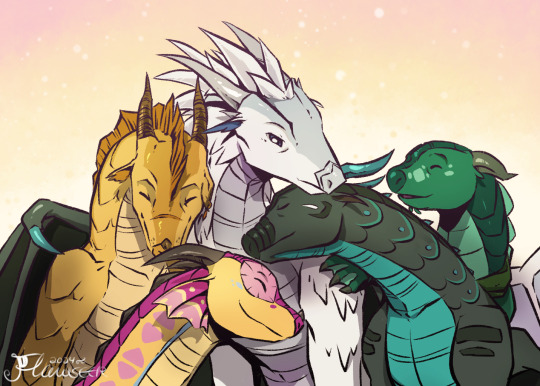
#wings of fire#dragon#wof#digital art#wof art#flawseer art#flawseer talk#flawseer reply#wof winter#long post#long winded
243 notes
·
View notes
Text
Sebastian Stan Talks Career Interests And His ‘A Different Man’ Film
By Jeff Conway

Sure, you likely know him for his many Marvel film appearances as Bucky Barnes, but actor Sebastian Stan has often taken “the road less traveled” when it comes to his career, having built quite the unique repertoire of memorable performances in far less conventional films.
That observation has arguably never been more visible than with his involvement in the new A24 film, A Different Man. Written & directed by Aaron Schimberg and co-starring Adam Pearson and Renate Reinsve, it tells the story of Edward (Stan), an aspiring actor who undergoes a breakthrough medical procedure to transform his facial appearance, but soon regrets his decision when he becomes obsessed with reclaiming what he has lost.

I sat down with Stan, Pearson and Schimberg to uncover the origin and the creative thought process that went into this new project, which is now playing in select theaters in New York and Los Angeles - nationwide come October 4. For filmmaker Schimberg, this purposefully uncomfortable narrative and the overall project hits rather close to home.
Schimberg said, “I mean, for me, it’s sort of a personal story. I have cleft palate and it’s just sort of me thinking about how it’s affected me in my life and others’ perception of me and my perception about myself. My previous film [Chained for Life] also dealt with the subject in some ways, so that’s sort of what I am always thinking about when I am starting to write a film. I was also thinking about Adam because I had worked with him previously and he played a shy character in Chained for Life, my last film, and he’s not shy at all - and yet, people I think sort of thought that he was playing himself in my movie because they sort of assumed that he must be shy. So, I was inspired to write something that was closer to who he is - taken to a comical extreme, maybe, and I wanted him to show off his range, but I also just wanted to work with him again, so these were some of the starting points.”

Pearson, a British actor with neurofibromatosis, which is a rare genetic disorder that typically causes benign tumors of the nerves and growths in other parts of the body, went on to share what it was about A Different Man and his Oswald character that most intrigued him to want to make this his next film.
“Well, I enjoyed working with Aaron the first time, so when he said, ‘Would you consider working with me again?’ Straight away, I was like, Ding Ding! Round two - let’s rock and roll. Then the script - all the words have weight. There’s very little wasted motion in the script. The end result of the film is quite challenging and holds up a mirror to an audience. I’ve never been a fan of hand-holding or sugar-coating. I think audiences can be a lot smarter than we often give them credit for. A good film will change what you think for a couple of days, but a great film will change how you think for the rest of your life. We’re certainly trying, at least, to be in the great film business.”
With Stan not only acting in A Different Man but also an executive producer, I wondered how he has perhaps noticed his interests and priorities towards the stories that matter most to him as a professional and human being evolving as time goes on.

Stan said, “Well, you get a little older and the questions get a little scarier. A few years ago, I just decided to kind of just be a little bit more aggressive about finding specific work that was interesting and different and kind of challenging for me than what I was getting to do. Eventually, you find yourself in conversations that are in the development of certain things and that might lead to a producing kind of aspect. I think in this [A Different Man] situation, I was involved before A24 came on, which never really happens for me. Not only because of obviously how I felt about the story and so on, I felt really brought in by Aaron and [producer] Vanessa [McDonnell] into their journey with this film and like what they were wanting to do. So, I felt a much bigger attachment than I usually do as an actor in a way.”
When it came time to film A Different Man, Stan recalls the production not having much time, which he actually found to be helpful within his producer role “because when you’re involved in some capacity beyond acting, sometimes you can kind of go, Hey, let’s continue shooting or something. You can help add more to the making of it in some capacity and that was big for us, given our time - that we didn’t have a lot of time.”

In fact, during one particular scene in the film, Stan remembers while everybody else was wrapping up the production trucks for the night, he decided to head out on the streets of New York City with his A Different Man director of photography Wyatt Garfield and Schimberg to grab additional footage. “I just kind of took one of his other little cameras and then we started going up and down Columbus Avenue. It was Friday night and we just got all these shots. Maybe you don’t always get to do that, so that was helpful.”
As I began to conclude my conversation with these three gentlemen, I wondered what Pearson and Stan would say to their A Different Man characters, Oswald and Edward, after seeing their stories play out on-screen and understanding their wants out of life.

Pearson said, “I’d be like to Oswald, Maybe turn it down a little bit. Be nicer to [Stan’s character Edward] because he might not say it, but he loves you and he needs you right now.”
As for the message Stan would tell Edward, he said, “Listen to me! I’m here - I’m telling you. I don’t know how I feel about this. Just hear me out.”
He then added: “It’s very interesting because we all have these moments in life, big or small, where you make a decision or you even say something because you’re with other people or you’re supposed to say something the right way, but you know your reaction in the moment or the decision you’re making is not what your gut is like really telling you. Then, you feel kind of like you’ve abandoned yourself, but then you just quickly deny that - that can kind of like spiral down. We’ve all kind of not owned certain things in the moment and that’s sort of what happens. He kind of drowns out that voice.”
#Sebastian Stan#Adam Pearson#Aaron Schimberg#A Different Man#A24#Interview#Jeff Conway#mrs-stans#StansClan#SebStan#SStan#sebastianstan#sebastianstansource#sebastian stan source#sebastiansource#sebastianstannews#sebastianstanedit#sebstanedit
24 notes
·
View notes
Note
if you feel up to infodumping about it, i would love to hear your opinions on the Weird Writing for sonic the hedgehog's female characters. i've always had a massive soft spot for elise she's such a strange person when you look past the Generic Love Interest framing of her story and i really wish she'd gotten her own game
Ahhh thank you for enabling me, I have SO MANY THOUGHTS on this subject!! I've been super fascinated with the weird gender dynamics emerging in the franchise ... nearly since female characters were added at all. I think I've only really been able to put my thoughts into words recently, but it's a subject I've been interested in since I first got into the series as a kid.
(Also, I feel you on the subject of Elise - super interesting character more or less accidentally emerging from a very bland role)
Note: As usual, I’m mostly talking about the mainline games and Sonic X. While Sonic has a lot of spinoffs, I think Sonic X is so close to the spirit of the games that it is not a stretch to count it as an entry in the series’ core installments, particularly the second series/season 3. Especially because it originated in the same era as most of the lore currently defining the games, and there was a lot of migration back and forth between the two continuities regarding both characters and worldbuilding.
Anyway! On the subject of gendered writing in Sonic stories!
IMO, the biggest paradox in the Sonic games' and anime’s approach to female characters is that sexist writing is all over the place ... and yet the female cast is overwhelmingly the most layered and thematically interesting! Which they're then generally tortured and killed for. Whoops.
In order to understand why, I think it's important to remember that at its core, Sonic is very heavily inspired by shonen anime. If anyone's interested, look into the games' weird copycat relationship with Dragonball Z, for one. Sonic games wish they were Dragonball games so bad, it has negatively affected much of their history (Shadow's repeated Vegeta-ification is a good example).
Like shonen anime (it's right there in the name!), Sonic assumes a male player, a male audience. For this reason, you'll have a wealth of "cool" male characters to play as. Cool designs, cool powers, more diverse roles. Playable female characters are extremely limited, with only Amy and Rouge being sincere attempts to diversify the central cast just a tiny bit (Cream and Blaze used to qualify as well, but I'd argue they eventually graduated to the second category I'm about to talk about; more on them later). The main downside of this role is that characters the player is expected to project onto become limited in the kinds of stories and arcs they're 'allowed' by the writers to participate in. They're intentionally kept static so they can neatly slot into multiple narratives without being disruptive. Many of the male characters have vestigial emotional arcs - Tails' insecurities, Knuckles' complicated feelings toward his ancestors, etc. - but they're never allowed to go anywhere, directly influence the narrative or conclude in a meaningful way. They’re here to observe, then save the day, and that’s it. Anything beyond that would complicate continuity between games - or worse, jeopardize Baby Boy’s First Power Fantasy.
On the flipside, many of the story-heavy games employ one-off supporting characters as the emotional core of their respective narratives. And what kinds of characters make great foils to cool, powerful, emotionally repressed dudes primarily existing independently of their own stories? Less action-oriented, highly emotional girls absolutely fucking drowning in that narrative sauce.
Let me be clear: it’s sexist. Defining male characters by their cool powers and ability to save the day, while female characters are defined by their suffering and need for help, is deeply sexist.
Let me be clear, part two: characters who are closely tied to their narratives, who embody the themes of their own stories, who are allowed to struggle, who are allowed to express emotions and for those emotions to directly influence the narrative, are largely much more interesting characters.
Characters who come to some form of resolution are more interesting.
Unfortunately, Sonic games are largely a strange exercise in placing cute, simple cartoon animal characters into weirdly brutal, tonally inconsistent stories that circle themes of sacrifice like sharks smelling blood.
And so the girls die. Or they’re emotionally broken. Or they’re separated from their friends - and thus the spotlight - forever.
A rundown of major female Sonic characters, their narrative purpose, and the price they had to pay for it:
- Tikal: A peace-loving ghost girl serving as a spirit guide in her sole game appearance. Revealed to have been betrayed by her power-hungry family, forcing her to seal her soul away for thousands of years in order to prevent the end of the world. When the threat passed, it seems her spirit did too.
- Maria: A deathly ill 12-year-old who lived in a sterile care facility on a space station, but retained hope that one day she would be well enough to return to Earth. She stood up to armed military forces to save her brother figure/best friend, and got fridged for the trouble.
- Cream: Introduced as a playable character, but largely discarded by the franchise after her sole moment of real character focus in the anime. A character introduced as a pacifist who hates violence, eventually forced to beat a close friend to death in order to protect her other friends.
- Blaze: Also initially a playable character who had one Big Moment(tm), then vanished from the plot after only starring in a single followup game. Once best friends with Silver, she chose to absorb a rampaging god into her soul in order to save him and the rest of the world. Time and space were rewritten, and she resurfaced in a parallel universe where she grew up alone and horribly bullied. Though she and Silver have met again, they never have officially reconnected and don’t remember their past life together.
- Elise: A vessel for a powerful evil who grew up emotionally distant from all other people in order to keep the evil contained. When she finally made a friend, she was forced to rewrite time so they would never meet in an attempt to save the world. There’s a chance she’s faring better in the new timeline, but how would we know? She vanished from the plot as soon as she’d made that sacrifice.
- Cosmo: The last of her kind, save for the small group of villains who murdered the rest of their people. Went through hell in the one season of the anime she was featured in, then promptly died in order to gain revenge on her enemies and save her friends.
- Shade: We don’t know if there were more plans for her character after her debut game, but as it stands, she showed up, was first brainwashed, then betrayed by her own people, and chose to leave behind everything she knew in order to protect the world from her family and former friends.
Note that these are all the major female characters who show up in the games and anime, save for Amy and Rouge. And that’s not even counting the female leads of the storybook spinoff games, Merlina (a hero turned villain who did everything in her power to save her world from future ruin, defeated and left to grieve over her inability to change a thing) and Shahra (another girl who died to save a friend; revived at the end of her story but never seen again), or Molly from the anime who did some kinda sick speedrun strat, showing up in ONE episode where she had her heart broken and committed murder/suicide after she was betrayed by people she trusted.
By contrast, we have exactly one male character who follows the same pattern - Shadow, who went through similar emotional troubles and was intended to die at the end of his debut game. However, due to popular fan demand, he was brought back to life and added to the roster of recurring male characters. He even had much of his depth culled from newer games to match the rest.
Much spin-off media does better in certain ways, but I don’t know ... there’s something about that extremely consistent pattern in the main games and anime. It’s such an interesting paradox, having the female cast be simultaneously the most layered and well-written, but also the ones at highest risk of being emotionally tortured and discarded.
It’s definitely not a pattern unique to Sonic either, but by virtue of being such mindless feel-good stories where a good attitude and good friends can literally work miracles, I think it just stands out all the more. This loyalty to the concept of altruism and respect for soft emotions, paired with insistence on tragedy.
But only if you’re a girl. If you’re a girl, you are at once special and expendable.
You’re the only one who’s allowed to really embody the emotional truth of whatever absurd plotline the writers have cooked up this afternoon, you’re the only one who’s allowed to really express what this story is about at its core, but also you have to die for it. Or be sent away. You can’t be here anymore, at least.
I have no idea who writes these games. I could not tell you if there really is an emotional core, if anyone is actually putting in effort. I don’t know if it matters, either. Death of the author, etc.
What I do know is that there’s a meta-narrative here.
Sonic, Tails, Knuckles, Silver, Omega, Vector, Espio, Charmy, Big, and sometimes even Mighty and Ray, go out on fun adventures to save the day. Amy and Rouge are here for flavor. We’ve decided Shadow can come, too, if he stops talking about his dead family all the time.
Tikal, Maria, Cream, Blaze, Elise, Cosmo and Shade (etc) show up for just a moment in time, go through trauma and heartbreak, and then disappear. Maybe they’ll have an unvoiced cameo later. If they’re lucky. If people like them enough.
There’s no real point to this, aside from explaining why I’m weirdly invested in just ... the concept of female existence in a children’s franchise mostly aimed at boys. Where everything will be okay, except when it won’t. Except when we need that bit of salt in the wound, so the victory will feel important, earned.
The price of getting real for just a moment being narrative death, if not straight up literal death.
Above all, Sonic games are cute. They’re appealing because they’re stupid and wholesome and weird. I love the male characters too, I’m not here for attempts at complexity, I’m here to have fun.
I’ve just also been feeling incredibly tempted as of late to write an ‘escape the narrative’ type deconstruction of these exact tropes, heavily inspired by Sonic and other children’s media in the same genre.
“Boys do stuff but have no feelings, girls have feelings but should endure all manner of suffering in order to protect others” is ... not an irrelevant theme to explore in our current media landscape, if you ask me.
even if I never get around to writing that, at least I made a sick Sonic AMV about all those poor girls going through hell for the sake of The Narrative, I should upload that sometime lol
also hey I haven’t finished Sonic Frontiers yet - sure hope nothing bad happens to our new melancholy girl character closely tied to her debut game’s story and themes ..!
#asktheherd#sketchertalkssth#obvs i haven't covered everything here#these are just the most relevant points#i would argue amy and rouge are not entirely exempt from the pain the other girls go through they just get it in a different way#and there are more interesting contrasts to bring up such as how silver and blaze have been handled differently despite being in similar#situations at the end of their shared narrative#also it IS important to mention that certain characters vanishing WAS affected by sonic 06 being a financial disaster. but the thing is#the male characters who were discarded around this time have largely been picked back up. the girls have not.#the narrative has to bend over backwards to bring silver into new games#while the fact that cream and blaze isn't here is like. weird. the comics had to make up excuses for why they weren't in Forces#they brought shadow back from the dead due to his popularity but blaze can't dimension hop just once in a while#despite being one of their most popular supporting characters?#anyway. lot of nuance. lot of potential tangents.#the point is this subject makes me feel some sort of way.#child death cw#suicide cw
19 notes
·
View notes
Text
Brennan’s statement on Palestine :
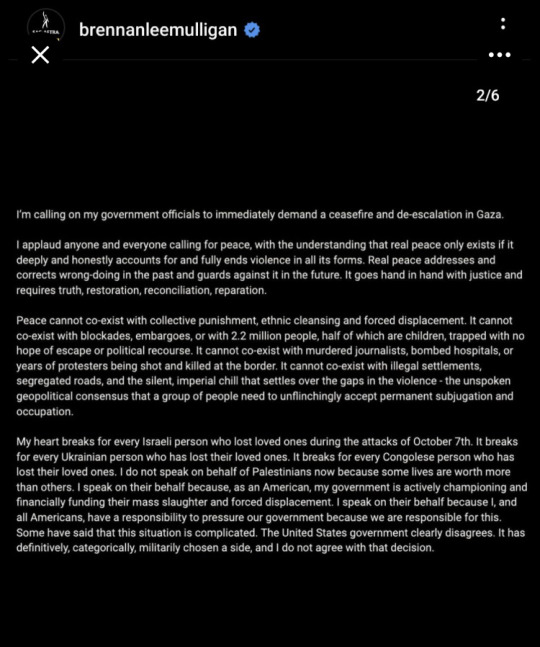
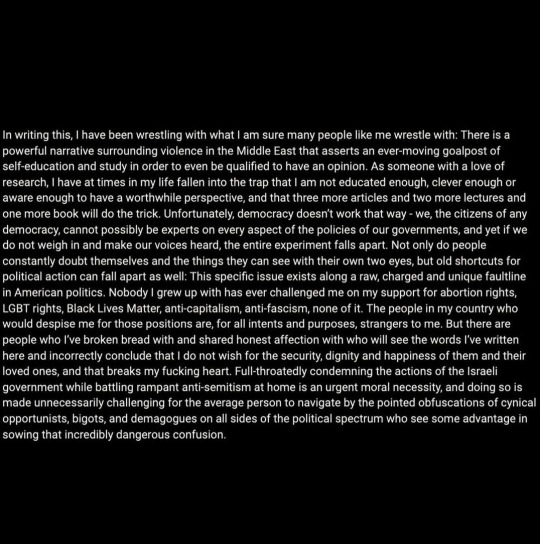
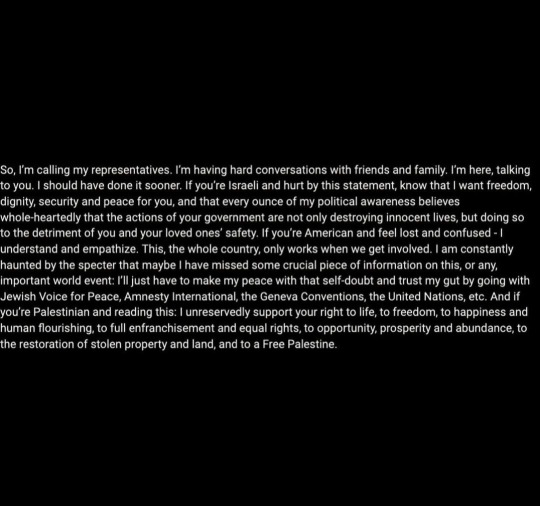
[ ID: Statement from Brennan Lee Mulligan, on Instagram. It consists of three black squares with plain white text. The text reads as follows:
"I'm calling on my government officials to immediately demand a ceasefire and de-escalation in Gaza.
I applaud anyone and everyone calling for peace, with the understanding that real peace only exists if it deeply and honestly accounts for and fully ends violence in all its forms. Real peace addresses and corrects wrong-doing in the past and guards against it in the future. It goes hand in hand with justice and requires truth, restoration, reconciliation, reparation.
Peace cannot co-exist with collective punishment, ethnic cleansing and forced displacement. It cannot co-exist with blockades, embargoes, or with 2.2 million people, half of which are children, trapped with no hope of escape or political recourse. it cannot co-exist with murdered journalists, bombed hospitals, or years of protesters being shot and killed at the border. it cannot co-exist with illegal settlements, segregated roads, and the silent, imperial chill that settles over the gaps in the violence - the unspoken geopolitical consensus that a group of people need to unflinchingly accept permanent subjugation and occupation.
My hear breaks for every Israeli person who lost loved ones during the attacks of October 7th. It breaks for every Ukrainian person who has lost their loved ones. It breaks for every Congolese person who has lost their loved ones. I do not speak on behalf of Palestinians now because some lives are worth more than others. I speak on their behalf because I, and all Americans, have a responsibility to pressure our government because we are responsible for this. Some have said that this situation is complicated. The Unites States government clearly disagrees. It has definitively, categorically, militarily chosen a side, and I do not agree with that decision.
In wiring this, I have been wrestling with what I am sure many people like me wrestle with: There is a powerful narrative surrounding violence in the Middle East that asserts and ever-moving goalpost of self-education and study in order to even be qualified to have an opinion. As someone with a love of research, I have at times in my life fallen into the trap that I am not educated enough clever enough, or aware enough to have a worthwhile perspective, and that three more articles and two more lectures and one more book will do the trick. Unfortunately, democracy doesn't work that way - we, the citizens of any democracy, cannot possibly be experts on every aspect of the policies of our governments, and yet if we do not constantly weigh in an make our voices heard, the entire experiment falls apart. Not only do people constantly doubt themselves and the things they can see with their own two eyes, but old shortcuts for political action can fall apart as well: This specific issue exists along a raw, charged and unique faultline in American Politics. Nobody I grew up with has ever challenged me on my support for abortion rights, LGBT rights, Black Lives Matter, anti-capitalism, anti-fascism, none of it. The people in my country who would despise me for those positions are, for all intents and purposes, strangers to me. But there are people who I've broken bread with and shared honest affection with who will see the words I've written here and incorrectly conclude that I do not wish for the security, dignity and happiness of them and their loved ones, and that breaks my fucking heart. Full-throatedly condemning the actions of the Israeli government while battling rampant anti-semitism at home is an urgent moral necessity, and doing so is made unnecessarily challenging for the average person to navigate by the pointed obfuscations of cynical opportunists, bigots, and demagogues on all sides of the political spectrum who see some advantage in sowing that incredibly dangerous confusion.
So, I'm calling my representatives. I'm having hard conversations with friends and family. I'm here, talking to you. I should have done it sooner. If you're Israeli and hurt by this statement, know that I want freedom, dignity, security and peace for you, and that every ounce of my political awareness believes whole-heartedly that the actions of your government are not only destroying innocent lives, but doing so to the detriment of you and your loved ones' safety. If you're American and feel lost and confused - I understand and empathize. This, the whole country, only works when we get involved. I am constantly haunted by the specter that maybe I missed some crucial piece of information on this, or any, important world event. I'll just have to make my peace with that self-doubt and trust my gut by going with Jewish Voice for Peace, Amnesty International, the Geneva Conventions, the United Nations, etc. And if you're Palestinian and reading this: I unreservedly support your right to life, to freedom, to happiness and human flourishing, to full enfranchisement and equal rights, to opportunity, prosperity and abundance, to the restoration of stolen property and land, and to a Free Palestine." End ID ]
#if anyone wants to do the id I will love you forever btw#brennan lee mulligan#d20#dropout#free palestine#dimension 20#I babble
7K notes
·
View notes
Text

K-Pop Spotlight: DAY6
Come one, come all to a K-Pop Spotlight that is sure to dazzle and delight ’til the final curtain. This week, all eyes are on DAY6 following the release of their eighth mini-album, Fourever, and brand new title track, "Welcome to the Show." We caught up with the band to discuss their goals as they approach their 10th anniversary and their ever-growing connection to their fans through their music. Check out our full interview below!
Tracks like “Welcome to the Show,” “The Power of Love,” and “Get The Hell Out” seem to have very different themes. Can you tell us a little about how these songs relate to each other and what aspects make this album cohesive?
SUNGJIN: As we pursue the idea of being a 'band that sings every moment,' it seems like our albums, including the recent one, prioritize diversity in songs and situations rather than unity. Consequently, our albums contain various genres and narratives. However, there seems to be a commonality in most songs, depicting situations that everyone has either gone through or might experience.
Young K: First and foremost, I would say this album is a compilation of the best songs we could create. There's definitely a theme of love running through it. "Welcome to the Show," "The Power of Love," and "Get The Hell Out" all talk about the concept of love.
What goes into creating titles for DAY6 songs and albums, especially those that don’t come directly from your lyrics? Do you find it hard to condense the intentions and themes of a song into a title?
Young K: While there have been cases like that, all the songs on this album came from the lyrics. Sometimes, when choosing a title, we select the one that best describes the song—other times, we choose to give it a twist or make it more intriguing.
WONPIL: Naming songs involves a lot of deliberation. We often contemplate which title will catch the eye and capture the song's essence. Usually, we try to take it from a verse in the chorus. This can be a challenging part of the songwriting process.
Is there a creative project you’ve always wanted to work on but haven’t gotten the chance/found the time?
SUNGJIN: I'm very curious, and have a principle of "trying to experience as much as possible." There are so many things I want to try musically and personally, especially among the things I know but haven't tried yet.
DOWOON: I hope we can have a song that we can collaborate on with My Day, like a choir.
What does your work/studio setup look like? Where do you feel the most creatively inspired?
DOWOON: We try to keep the studio as tidy as possible and make it comfortable for practice sessions.
WONPIL: When working on songs, we talk a lot. We get inspiration from little conversations, joking around, sharing stories, and listening to music from various eras regardless of genre while giving opinions. We also try to build emotional connections with the songs. There’s a lot of communication going on. The songwriting process takes place in the studio of our long-time collaborator, composer Hong Jisang, with whom we've been working together since our debut.
How do you want to evolve as a musician/producer?
Young K: I want to be eagerly anticipated and awaited as an artist. Without those who wait for us, we wouldn't release or even step onto the stage. So I’m always thankful for My Day.
WONPIL: My biggest goal is to make good music for My Day and the public, so I think I'll continue to ponder. When working on songs, I pour my sincerity into them. I constantly strive to express this sincerity musically, fully capturing the emotions I want to convey. I hope to create songs that can still be listened to even after 10 or 20 years.
Design your own Tumblr blog: choose an aesthetic, a blog name, and would you be a frequent poster or lurker?
SUNGJIN: I think I’ll use it to catch up on friends' updates. For the blog name, THUMB BLUR sounds good to me. I might end up being a lurker who never posts.
DOWOON: Maybe a blog for plants? I think I'll post it like a diary.
Want more DAY6? Check out their new mini album Fourever and the music video for the title track “Welcome to the Show,” both out now!
668 notes
·
View notes
Text
i thought the ending couldn't be more disappointing and then this japanese tweet proved me wrong
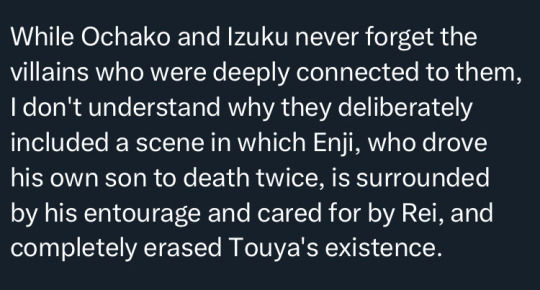
because all of this is true. Ochako and Izuku will never forget Toga and Tenko and half of their epilogue was about this, however messily done. Ochako dedicated herself to creating better conditions for people like Toga, because she saw how badly Toga was suffering and despite failing to save her and give her a brighter future, she committed to building that future on her own, selflessly gifting it to others. Izuku had failed to save Tenko despite wanting to, and this weights on his conscience eight years later, and will continue to haunt him in the form of Shigaraki's ghost watching him, not letting him forget himself in the happy ending of joining his hero classmates and achieving his dream.
it's still messy and unfaithful as fuck, but at least these two endings still show that the consequences were there. the unfair deaths of the villains weren't simply swept under the rug and forgotten after a few sad talks about them.
and the thing these two cases share in common? Ochako and Izuku really didn't owe it to Toga and Shigaraki to save them. they didn't. they were hero kids thrown in the middle of the war these very villains waged on them. they both were younger than their respective villains, they both were hurt by these villains, they had no prior history with them, and having shared a few conversations was enough to make them emphasize with and humanize the villains. nothing that happened to Himiko and Tenko was inflicted on them by Ochako and Izuku, and yet just seeing that, hearing about that was enough to ignite sympathy in their hearts. because, you know, they are heroes. they are there to save people from suffering. and even when those people are the ones actively hurting them and their friends, they are mature enough to set that aside and attempt to save their human lives.
enter the star of the show, the only character in this story who despite having committed truly villainous acts, is allowed to go consequences free without a single care in the world. Enji. the person who had single-handedly fucked Touya up to the point his mental state was too messed up even for AFO to deal with. he had given life to this baby, and he was constantly made aware of how badly his attitude is affecting this child by Rei. and he couldn't be bothered to do anything for him, not even to look at him. the fire on Sekoto was 100% Enji's fault, not only because he couldn't be bothered to come visit his son on his day off when Touya had asked him to, but also because the number two hero on his day off was too slow to come to the forest near his house to save Touya from the fire or from All for One. this makes Touya being kept under AFO's care for the following 3 years Enji's responsibility, as he was the only one who could have saved Touya from AFO. even after Touya wakes up from his coma and immediately runs to his house as fast as he can, it's Enji's behaviour alone that makes him decide against making his presence known to the family for the following 7 years. this excuse of a father can't even mourn the death of a son he explicitly blames himself for in such way that won't make his entire existence feel meaningless to him.
and after Touya reveals himself to Enji personally as Dabi? he proves that he still hasn't changed at all and utterly fails to do anything about the situation while Shouto has to repeatedly remind him of it. not only was he procrastinating, the narrative was coddling him the entire time, with the support of other heroes and sidekicks, who despite being shown the truth about Enji, choose to ignore it. even the family he has been abusing for years, the family who was mourning Touya together, joins their efforts to support Enji.
Touya's only desires were to be seen and to be heard. both went unanswered, as after showing the world the unfiltered truth of the misery his father had caused to him, the world covered their earths and turned away. after showing himself to his family, they keep looking at Enji, not at him.
even at the very end, the end of the family's hell is more about Enji than about any other character. he is the only one allowed to talk about his feelings in depth, while the rest of them are reduced to barebone imitations of their previously established characters used as props for supporting Enji's character resolution (with the exception of Touya, who is physically unable to speak for longer than 5 minutes a day anymore. wow). even Natsuo cutting off Enji is less about the latter being a horrible excuse of a father and more about Enji's great stoicism accepting everything the family throws at him with a heroic face. Rei's character no longer makes sense because exactly a month ago her mental state and the trauma inflicted on her by this very man didn't allow her to face him at all. and now she is suddenly okay with becoming his caretaker? why is she taking her responsibility for Touya and not talking about Enji's responsibility at all? this was a man who had abused her so badly she had a psychotic episode. you don't just shrug off things like this. you don't sit in a psychiatric ward for ten years after that, waiting to be let out and jump on the first chance of making yourself useful for your abuser. you don't set aside the relationships with the children he had hurt and he had made you hurt to devote yourself fully to your damn abuser. someone take this poor woman out of this Stockholm syndrome relationship.
at this point Touya not being allowed to die is the worst offence, because the survival wasn't granted to him to heal. it was given to him for the singular purpose of making Endeavor look slightly less bad. Enji never even talks about failing to save Touya (and neither is Shouto allowed to). if you wanted to save him, then him being stuck immobile and isolated from the world with only months left to live is not 'the time Shouto gave us with him' it's a failure. he's not your damn pet, why is the narrative making him into one?
Touya had wanted to die. Shouto points this out, Touya himself talks about it. Enji was the one who didn't want him to die. he also didn't want to die himself. somehow, his desire is the only one that is fulfilled, while even Shouto's dream of eating soba with his older brother goes ignored.
and afterwards? Enji happily moves on from this with the new family he had found for himself, while Touya's childhood desire of his family looking at him is fulfilled in the most grotesque way possible. and the family's dream of having a home away from Endeavor? not a chance lmao
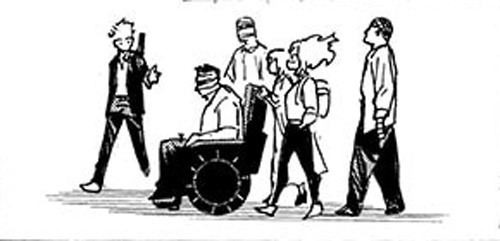
#man i can't deal with it anymore#NEED a fix-it#where Touya never talks to his family ever again#if this is the reunion Hori decided to give js#bnha#bnha spoilers#todoroki touya#dabi#todoroki tei#todoroki shouto#anti endeavor#bnha critical#salt#you would think enji was based on hori's higher up with the way the narrative is giving him private lap dances
167 notes
·
View notes
Text
I saw this really great thread on twitter by Grungygrim and it definitely highlights my thoughts and frustrations with the story of these games and the Splatoon fandom as a whole. (be forewarned, i get really tilted in this blog post fyi.)
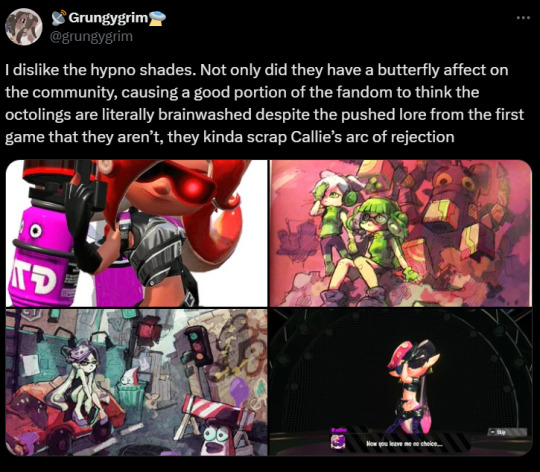
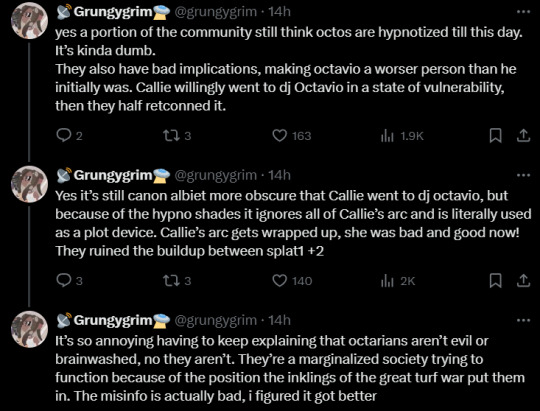
I made a blog post about 2 weeks ago where i said that i was happy that the narrative online that "Callie is an idiot who got kidnapped and then brainwashed/mind controlled against her consent" is going away. (Here's the link: https://www.tumblr.com/dr-spectre/749710338672525312/im-so-happy-that-the-narrative-online-that?source=share)
Unfortunately I'm gonna have to retract a lot of the stuff i said. I'm still seeing, TILL THIS DAY THAT NARRATIVE ONLINE! IM STILL SEEING SO MUCH MISINFORMATION AND IT MAKES ME REALLYYYY ANGRYYYY!!! As a big fan of Callie, people completely outright ignoring her character arc THAT WAS SET UP SINCE SPLATOON 1 BY THE WAY!!! and not even bothering to look at outside sources for more information and lore genuinely pisses me the fuck off to no end.
No, hypnosis is NOT MIND CONTROL/BRAINWASHING! I DONT WANNA KEEP REPEATING IT! YOU CAN LOOK IT UP! if a person is genuinely uncomfortable and doesn't wish to take the suggestions to heart while hypnotized, THEY WONT DO SO! THEY STILL HAVE CONTROL! Yes, Marie did say "kidnapped" in some of her dialogue, but from her perspective, OF COURSE SHE'S GONNA THINK CALLIE GOT KIDNAPPED! She's known to worry about Callie all the time and ruminate about her, of course she's gonna think of the worst case scenario, doesn't mean she's right though. Was Octavio still in the wrong for hypnotizing Callie in the first place and allowing her to bring out her darker traits more easily? YEAH! NO SHIT! HE'S A BAD DUDE! Not a totally evil person but he has made some awful decisions out of desperation for his people. Why do you think he was so quick to help out the New Squidbeak Splatoon in the finale of Splatoon 3? His people got turned into fluffy monsters by a giant bear, he's all about helping his people.


Hell look at how Callie acts while under the Hypnoshades, she decorates Octo Canyon and her peppy and energetic self is still in tact even during the final boss, she's just more mean and violent. Callie was in an emotional and mentally unwell situation due to her overworking herself and being incredibly lonely as her relationship with Marie was damaged overtime. Callie accepted the suggestions of DJ Octavio and heard him out, AS SAID BY HER FROM THE RELATIONSHIP CHART! She wasn't forced into anything. She didn't suffer "sexual abuse" from Octavio by being forced into skippy clothing as some psychos say online, if she didn't want to wear that outfit she wouldn't cause hypnosis is NOT MIND CONTROL!! I hate having to repeat this over and over again, i hate how the developers basically rushed and ruined this interesting villain arc with stupid shades, only to try and hastily fix it later with an obscure post about A GOD DAMN RELATIONSHIP CHART THAT PEOPLE EITHER DONT KNOW ABOUT OR DONT CARE TO LOOK AT BECAUSE THEY SEE SPLATOON AS SOMETHING FOR KIDS AND TO NOT GIVE ANY CARE TOWARDS!!!!!!!!
I made a god damn giant blog explaining Callie in Splatoon 2 because i felt so frustrated about how my favorite character in the series was being treated and i tried to salvage the story that the writers tried to make. The way that people made her situation worse by saying she got kidnapped and forcibly ""mind controlled/brainwashed"" actually gave me chest pain, thinking about that kind of scenario for Callie actually hurts me... Heck i cant even listen to the Splatoon 2 stage music or final boss music because hearing her reversed vocals makes me feel uncomfortable due to the misinformation online. I hated all the misinformation and i wanted it to stop. HELL EVEN IN GIANT TIMELINE VIDEOS WHERE PEOPLE DO TONS OF RESEARCH THEY STILL GET IT WRONG!! UGHHH!!!!!!!!!!!!! i guess it'll still be the common and popular notion that Callie is an idiot that got kidnapped and then ""mind controlled"" by some shades... oh well... ugh...
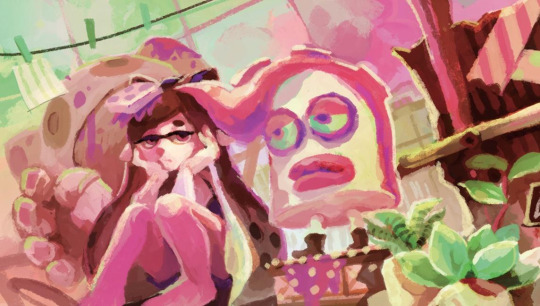
I'm sorry if I'm coming off as really angry, i am. It's just, my brain is really hyperfixated on this squid and she means a lot to me. Seeing the way the fandom as well as the writers treat her makes me really mad. I hope i can find some peeps who feel the same way as i do. Misinformation is so frustrating man... i dont even wanna get into the Octarians because that's a whole other can of worms... anyways im done ranting. have a good night or good morning wherever you live y'all.
#splatoon#splatoon 2#splatoon 3#callie cuttlefish#callie splatoon#rant post#complaining#sorry for the rant#octo callie#dj octavio#marie splatoon#marie cuttlefish#octo canyon
244 notes
·
View notes
Text
An analysis of Bianca di Angelo's role in the narrative and why bad writing can screw over a character.
For someone with such a limited time in the narrative, Bianca is one of the most divisive characters in the fandom. I've been in the fandom long enough to see how much nuance the fandom lacks when discussing certain characters and Bianca is no difference. But it's more than just viewing the characters' actions in a vacuum. It's ignoring the larger narrative problems. At the end of the day Bianca suffers from one simple problem: she's barely a character outside of her role in Nico's narrative. Like it or not, her entire character exists to die and give Nico issues down the road but Riordan's writing decisions didn't do her any favours either.
I feel like this is a huge issue when it comes to the pjo fandom they often try to come up with Watsonian solutions to problems that are Doylist in nature and Bianca is one example of that.
Case in point: Riordan's shit math when it comes to the Di Angelo siblings and how it messes up with bianca's character.
So when we meet them they're 10 and 12. We learn that their memories of their past is kinda hazy and that they don't remember their parents but that they were in a boarding school, then they moved to the lotus hotel, then they were taken out of the hotel and put into Westover's. And at the end we learn that they're Hades's children born before the oath of the big 3.
Said oath happened after WW2 btw. So 1945 probably since Bianca remembers FDR's presidency.
Now in TLO we get an update on this backstory. Hades is speaking to Maria about moving his children to the underworld or the lotus hotel since Maria doesn't like the former option because the war has put Hades in a bad situation with his brothers and also the prophecy is out, the oath has been taken and they're running out of time to hide the kids. So logic says that it's 1945. And then Zeus immediately kills Maria and Hades tells Alecto to erase the children's memories and put them in the lotus hotel, and honestly? I like this version much better? Because why in the world would Hades Put his children in a boarding school for a few years and THEN hide them in the hotel after they were nearly assassinated? Why not immediately put them in the hotel?
And so we get to our main dilemma. Bianca having to raise Nico. This was already strange to me because it's not as if this is a Jason and Thalia situation where Jason was a toddler and Thalia had to take care of him. Nico is not a baby they have a two year age difference. But of course these kinds of things might matter more if you're young. Even then, in what situation would Bianca be Nico's main caretaker? They were put into a magic hotel that mind you, makes time go faster so for them it was a month or two at best and they would have been given whatever they needed by the staff? Same type of issue with Westover's and the boarding school if you want consider that canon. They would have been taken care of by the facility. They probably wouldn't even have shared classes or dorms? Or am I misunderstanding American boarding schools?
And then, Riordan's bad math strikes again and this time with the characters' ages. Because Nico's age in HoO becomes 14 which would have made him 11/almost 12 in TTC but that's not the big problem, no no no. The problem comes from his official birthday which is 1932.
1932... Which would have made him 13 and Bianca 15 by the time Maria dies. Which is hilarious because with the way the kids are written during her death scene as absolute non players with nary a reaction, you would think they were written to be toddlers who didn't understand anything that was going on.
That royally screws over Bianca as a character (and me as someone who's trying to write a story centered around her). Because her main thing. The one time she's allowed to have complexity is the moment where she talks about how she wants to be more than Nico's caretaker, and she's barely Nico's caretaker at all. The best in universe explanation I can come up for this is that this is how Bianca perceives things because that's all that she literally remembers. Those months in the hotel and Westovers.
Another time the plot kinda messes her up is at the beginning of TTC. One complaint that I often see in regards to her Is how quickly she makes her decision. She does not even hesitate. She does not even wait to see the camp. You know the place that would have taken care of her and Nico which would have meant she wasn't going to be his supposed primary caretaker anymore? She doesn't even wait to see if it was an actual good place for her brother? Spoiler alert: it's not camp half-blood at the time was not a good place for either of them really. Nico did not have a cabin at camp and people were not accepting of him. Hell, people not being accepting of hades and his children was something established since the first book.
But once again, this is a Doylist problem at its core. We need to turn Bianca into a hunter but we also need Artemis to leave so that she can be kidnapped for the main conflict, so she leaves before the hunters even reach camp. Half-blood. So Bianca as a character doesn't even get to make a proper choice between the camp and the hunters. To people who only look at characters on an in universe level, it comes off as very rash and not well thought out.
To be fair, on an in universe level, she's a kid so it's okay if she's stupid, but Riordan wasn't trying to make her come off as that way? He treats Bianca's decision as a legit serious choice and not the rash decision of a desperate child.
And once again, Bianca is here for Nico's sake more than anything. She needs to die. So she takes the statue for Nico. Which is so ironic and tragic if you decide to play it that way. That Bianca wanted to be more than Nico's sister, but her literal death revolves around being his sister. Normally I'd enjoy this level of angsty irony but unfortunately that's how the very narrative treats her as well. Even her post mortem decisions are there to maximize Nico's angst more than that they're there to say anything about Bianca herself. We need Bianca to only appear at the end of Botl so that Nico and Percy can have a conflict but it once again comes at the cost of Bianca herself coming off as callous. What's the in universe reason for this behavior? It's so stupid because in universe, Nico doesn't even take that much convincing? One conversation. One conversation and Nico was convinced to stop his efforts in reviving her. Does she just not know her brother enough? Maybe since they technically know each other for a year max. Does she genuinely think she's that easy to give up on? Is she that conflict avoidant? I actually like this interpretation and plan to use it. There's much to be done with a character who's rash and bold but an absolute emotional coward who'd try to avoid an emotionally charged conversation until they absolutely can't.
Hell even after Botl, it's the same song and dance. Hades makes an absolute vile remark at Nico's expense. TSATS makes it into a joke moment and has you believe that Hades simple said that Bianca would have been a better demigod. No ladies and gentlemen. Hades literally tells Nico that he wished Bianca had survived instead.(The fact that I still think that hades is the best godly parent just shows you how low the bar is more than anything.)
I swear to God I spent so much time racking my brain trying to understand what this could mean for Bianca's character.
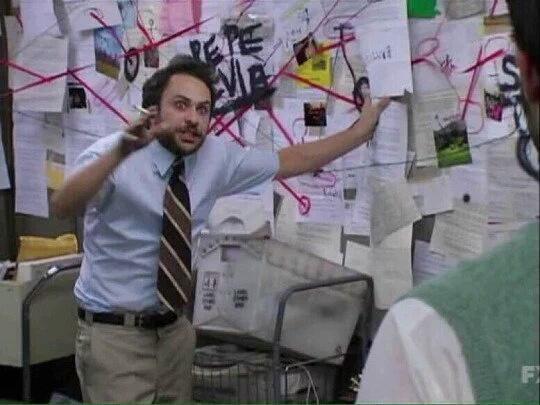
This is how I basically look like trying to milk every scene where Bianca is there as a character or is mentioned for every drop of characterization.
At the end of the day, I can't blame most of the fandom for being ambivalent towards her at best. The story by design is about Nico. It's designed for you to sympathize with him and yeah if I'm to look at it from Nico's perspective. He DID get abandoned, regardless of Bianca's intentions. From his Perspective , which is the one most people would take, his sister took the very first chance she could to ditch him for people she barely knew hoping people either of them barely knew would take care of him even though they haven't even seen the place yet, and then ignored him for months while he was desperate for a single conversation with her. Honestly had Nico outright resented his sister for leaving, I think the reaction towards her would have even been worse.
(Another sidenote, my very hot tea Is that I like to believe that had Bianca lived her and Nico's relationship would have become worse as time went on and as the camp's anti hades sentiments really started taking their toll on Nico. But I'm just an angst lover)
Worse is that this story is told from Percy's perspective and these two only have like 3 actual conversations together. One of them is her dying, one is about her making her first main decision and that's at the expense of Nico who's probably the fandom favorite behind Percy and Annabeth and the other is her trying to explain her aforementioned decision to Percy and even then, she talks about it in such broad strokes. "I want to be more than X" tells us about who you one day wish to be not about who you are at the current moment. And even when we have Nico as a POV character, Bianca is only there for "dead family member" trope. There's barely any moment where Nico remembers anything important about her to give her any depth. The cards are just stacked against her. Even the people who are at the "Bianca did nothing wrong camp" are barely interested in her. I swear to god whenever an AU comes up where she's alive, the focus is STILL on Nico. Oh Nico would have been such a happy person had she lived! And Bianca? Uhhhhh she would have fucked off with the hunters I guess?
Can we talk about the hunters while we're here?
If we WERE to talk about in universe scapegoats, I'd honestly choose the hunters. Honestly I could make a separate post about how much I hate how Riordan handled them. But oh dear God the way they're presented just comes off as creepy. The way they initially (up until TOA) only go for young girls because apparently older girls aren't useful once they hit puberty and start developing feelings for people and lose themselves(TTC and Percy Jackson's Greek gods oh dear lord are they terrible in Percy Jackson's Greek gods). How they're basically the heroine dumping ground for when Riordan doesn't know what to do with a female character. How ultimately in universe, Zoe more than anyone is to blame to for Bianca's death by taking an untrained girl to a mission where she KNOWS two people would die at the very least. And she doesn't even watch her properly during the mission. Honestly I could barely feel anything about Zoe's death upon rereads as an adult for this very reason. Or how stupid it is to basically put a child in front of a candy store and expect them to make a responsible decision. Who in their right mind would have young girls as young as nine take a celibacy vow? Oh but you'll be safe with us (never mind that we're not just normal hunters here like the actual myths but actual monster hunters) and you'll totally be able to see your brother when you want (actually we barely visit camp half-blood) oh but you'll be a FAMILY with us! Except you know if you catch feelings or get assaulted(holy hell how Riordan depicts the myth of Callisto makes me want to tear my hair out of my scalp)
#pjo#percy jackson#nico di angelo#bianca di angelo#artemis#pjo artemis#artemis pjo#bianca pjo#pjo Bianca#percy jackson and the olympians#percy jackson and the titans curse#pjo hoo toa#the hunters of artemis#pjo meta#rr crit#rr critical#anti rr#anti rick riordan#rick riordan critical#riordanverse#pjoverse
165 notes
·
View notes
Text
5 Good Omens Timefucks that Haunt Me
1.
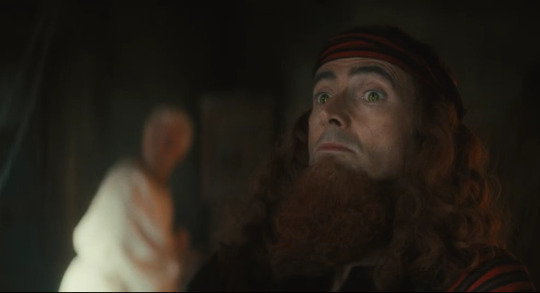
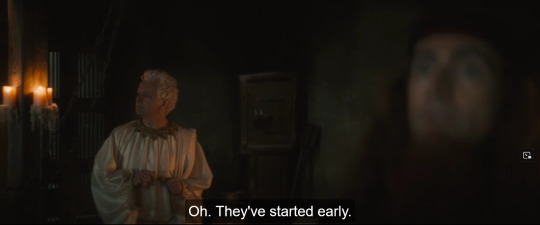
Why is this here? Why is this line included? Is it just to add texture, to imply that larger world of corporate fascism of which Crowley and Aziraphale are subjects and victims and little worker bees? If so, why "They've started early" specifically? Why not "I wouldn't have expected that shrub to be the first to go" or "Aw, I liked that rock formation"?
Crawly doesn't make this comment in an offhand way: he sounds a bit taken aback and not thrilled that things have kicked off sooner than he anticipated. But it doesn't ultimately seem to make any difference to this scene, so why do we, the audience, need to know Hell started early?
2.


This one I'm not as confident will turn out to be significant, because iirc it appears in the book, which was a complete story when written, and because it serves a narrative purpose: it puts Agnes Nutter in charge of the situation, not her murderers. By backfooting Witchfinder Major Pulsifer, Agnes startles him enough she's able to walk past him without Pulsifer seizing her and discovering the extra 80 lbs of gunpowder and roofing nails in her skirts.
But. Agnes Nutter's sense of time is Nice and Accurate, and she notices the witchburning party are late and remarks on it to herself before she says anything to Pulsifer. So assuming a few minutes to position Agnes, tie her to the stake, and read the charges and conviction against her, Pulsifer and Agnes' neighbors are 12-15 minutes later than they should be. Why?
If the book answers this question, I don't recall; the show does not. And again, it seems to make no ultimate difference to this scene.
I'm not saying this was even purposely included in S1 as a timefuck. I am suggesting that as Gaiman seems to be fucking with time or timelines in this story, even if he and Pratchett didn't plan it like this when discussing the sequel, a retcon is hardly out of the question.
3.
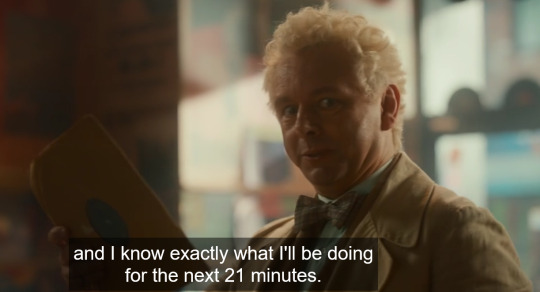
As others have pointed out, Shostakovich's Symphony No. 5 is 45-55 minutes long. If you're listening to it on 78s instead of LPs because you are a CRAZY PERSON, it's going to take you more like 1 hour 5 minutes, because one side of a 78 holds, at most, 5 minutes of music, so every 5 minutes you have to get up and flip or switch the record.
Shostakovich wrote his 5th symphony in response to criticism in the state newspaper (possibly penned by Stalin himself) that his previous work didn't suck the Communist Party's dick hard enough--the kind of criticism that put him in danger of being sent to prison or killed. At the time it was first performed in 1937, Symphony No. 5 was considered a massive triumph, walking the line perfectly between Shostakovich's artistic standards and the Communist Party's demands of him.
The choice is symbolically significant, but it's a symphony, so whoever's censoring it isn't censoring lyrics or information. Again, why? Why is a 45-55-minute symphony only 21 minutes long? What did the time thief do with the 24-34 minutes?
4.
Here's the rug that covers the portal to Heaven in Episode 1:

Here's the rug in Ep. 2:
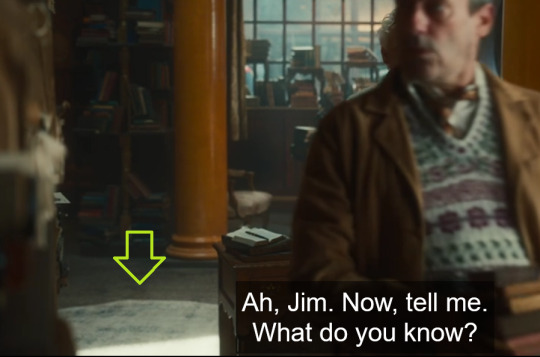
Aziraphale does not change this rug for the party. We know this bc we see it in Episode 5 when Mrs Sandwich enters the bookshop and the party is in full swing:

Now here's Aziraphale moving the circular rug to expose the portal to Heaven:
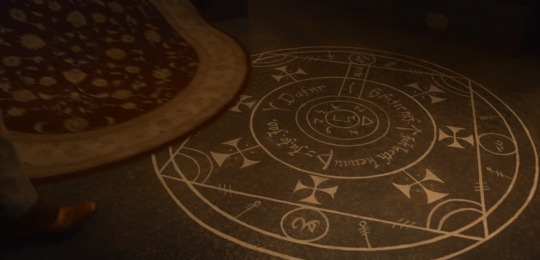
But here's Crowley, putting the rug back:

Why are there two different rugs?
5.
Every end credits track has the first line of "Everyday" embedded in it But after the line from "Everyday," at the end of Episode 4, the theme skips twice like a vinyl record, and then is stopped by whoever controls the turntable and restarted, with several seconds of music having been skipped over.
This is not the first time it has mattered to a character in Good Omens what we in the audience see and hear. I argue here that God asks Aziraphale what he did with the flaming sword She gave him in order to show us the audience who Aziraphale is. God also addresses us the audience directly in S1, not only narrating about characters omnisciently but speaking to us about Herself in first person.
Now we evidently have a second character who has gone meta and is changing what we the audience experience of this story, and--indications are good--the story itself.
#good omens#good omens s2#good omens meta#good omens timefucks#good omens chronology#good omens discontinuity#good omens as metafiction
659 notes
·
View notes
Text
Embracing Chaos: A Pantser's Guide to Crafting Compelling Fiction
Planning a story when you're a pantser (someone who writes "by the seat of their pants" without extensive outlining) can be a creative and fluid process. Here are some steps to help you plan a fic, even if you prefer to write without a detailed outline:
Start with an idea. Begin with a basic idea or concept for your fic. It could be a character, a situation, a setting, or even a specific scene that's been floating around in your mind.
Character Sketches: Develop your characters. Write down their names, physical descriptions, personalities, and backstories. Even if you don't plan everything in advance, knowing your characters well can guide your writing as you go.
Set your goals: Determine what you want to achieve with your fiction. Is it a short story, novella, or novel? What's the central theme or message you want to convey? Understanding your goals can give your writing direction.
Identify Key Plot Points: Instead of a detailed outline, focus on identifying key plot points or moments you want to include in your fic. These could be major events, conflicts, or turning points. Think about the beginning, middle, and end.
Create a Loose Timeline: Organise your key plot points in a loose chronological order. This will help you maintain a sense of structure without stifling your creativity. You can rearrange or add new points as you write.
Develop Themes and Motifs: Consider the themes and motifs you want to explore in your fic. These can help guide your writing and give it depth. Themes could be love, friendship, redemption, etc.
Write a First Scene: Start with the opening scene or chapter. This will help you dive into the story without feeling overwhelmed by the entire plot. As you write, let the characters and situations evolve naturally.
Follow Your Characters: Allow your characters to guide the story. As you write, pay attention to how they react to situations and make decisions. Sometimes, the best plot twists come from character-driven choices.
Embrace Revision: Understand that your story may evolve and change as you write. Don't be afraid to revise and rewrite parts of your fic to maintain consistency and improve the overall narrative.
Use Writing Prompts: If you ever get stuck or need inspiration, consider using writing prompts. They can help you generate new ideas and keep the creative juices flowing.
Beta Readers or Feedback: If you're comfortable with it, share your work with beta readers or writing groups. They can provide valuable feedback and suggestions to help you refine your fiction.
Stay Open to Change: Be open to making major changes if the story naturally takes a different direction than you initially planned. Sometimes, the best stories come from unexpected twists.
Trust the Process: Remember that everyone's writing process is different. Embrace the pantser approach if it works for you, and trust your instincts as a writer.
Writing as a pantser can be an exciting and spontaneous journey. While it may require more revisions and editing along the way, it often leads to unique and organic storytelling. So, start writing and let your creativity flow freely!
618 notes
·
View notes
Note
Could you write an Adrien x reader imagine where they’re forced to date by their parents to promote an upcoming fashion collaboration something, and then go from hating each other and being super fake to falling in love for real?
You know what? I postponed this ask waaaay to much. So what did I do? I sat down and took up your challenge. Go and enjoy the story you asked for but I never put the effort to make - until now e.e
warnings? no warnings apply :p
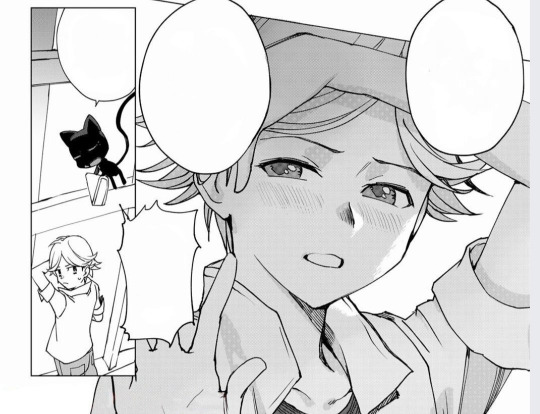
You always thought arranged dates were a relic of the past, something that only happened in old movies or distant cultures. Yet here you were, sitting across from Adrien Agreste, the face of the Agreste fashion empire.
Your parents have arranged this meeting to promote an upcoming collaboration between their brands, hoping the buzz around your "relationship" would skyrocket their sales.
Adrien looked perfect, as always—his blond hair artfully tousled, green eyes bright but distant. Always maintaining the perfect façade. Unlike you, painfully aware of every imperfection and every nervous gesture.
"Let's get one thing straight," Adrien said, breaking the silence. His voice was calm but firm. "We don’t have to like each other, but we do have to make this work."
You nodded, feeling a mix of relief and annoyance. "Agreed. Let's just get through this."
For the next hour, you both put on a show for the paparazzi lurking outside, sharing forced smiles and rehearsed lines. The whole encounter felt like a poorly scripted play, and you couldn't wait for it to end.
The next few weeks were a whirlwind of public appearances, photo shoots, and meticulously planned dates. Your parents had spared no expense in crafting the perfect narrative: two young heirs, brought together by fate and fashion. But behind the scenes, your interactions with Adrien were cold and apathetic.
One evening, after yet another tedious event, you found yourself walking alone in the Agreste mansion. The luxury of the place was suffocating, each room a reminder of the pressure you were under.
You wandered into the library, seeking solace among the rows of books.
"You like to read?" Adrien's voice startled you.
You turned to find him leaning against the doorway, a curious look on his face. "Yeah," you admitted. "It's one of the few ways I can escape."
He nodded, stepping into the room. "I get that. Sometimes I feel like my whole life is scripted. But I prefer watching anime to get some distraction." And patrolling as Chat Noir, though he wasn’t about to expose his best-kept secret to you.
For a moment, you saw a flicker of vulnerability in his eyes, and it struck a chord within. Maybe you weren't so different after all.
As the days passed, the cracks in your mutual disdain began to show. You still argued over trivial things and maintained a facade of disinterest, but there were moments—small, fleeting moments—when you glimpsed the real Adrien beneath his polished exterior.
One afternoon, you were both at a photoshoot for the collaboration campaign. The theme was a romantic picnic, complete with a vintage blanket and a basket of props. The director called for a break, and you and Adrien found yourselves alone in the park.
"Here," Adrien said, handing you a water bottle. "You look like you could use this."
"Thanks," you replied, surprised by the gesture. "I didn't expect you to be so… thoughtful."
He shrugged, a small smile playing on his lips. "There are a lot of things you don't know about me."
He hesitated, then said, "Like how terrible I am at cooking. I once set the kitchen on fire trying to make toast."
You laughed, picturing the usually composed Adrien in such a chaotic situation. "Seriously? Toast?"
He grinned, a little sheepishly. "Yeah, it was pretty bad. I had to call the fire department and everything. My father was not impressed."
You chuckled, the tension between you easing a bit. "Well, remind me never to let you near my kitchen."
He laughed along with you, the sound genuine and warm. "Deal. And maybe one day you can teach me how to make toast without causing a disaster."
One day, after a particularly exhausting photoshoot, Adrien and you found yourselves with a rare afternoon off. Deciding to make the most of it, you both ended up in the Agreste mansion's sprawling garden. The setting was beautiful and serene, a perfect escape from the public eye.
As you wandered through the lush greenery, admiring the flowers, you suddenly felt a cold splash of water on your neck. You turned around to see Adrien standing there, a mischievous grin on his face and a small water gun in his hand.
"Did you just...?" you began, but before you could finish, he squirted you again, laughing.
"Lighten up!" he teased. "It's just a bit of water."
You couldn't help but laugh, the unexpected prank breaking through the formality that often hung between you. "Oh, you're going to regret that!" you said, grabbing a nearby watering can and splashing him back.
What ensued was a playful water fight, with both of you dodging and splashing, laughing like carefree kids. It felt liberating to let go and just have fun, forgetting about the pressures and expectations that usually weighed you down.
Finally, drenched and out of breath, you both collapsed onto the grass, still giggling.
"Okay, I have to admit, that was pretty fun," you said, wiping water from your face.
Adrien smiled, his eyes sparkling with amusement. "See? I knew you had it in you."
"Just don't make a habit of it," you warned playfully. "Or I might have to come up with a prank of my own."
"I'd like to see you try," he challenged, his grin widening.
As you lay there, catching your breath, you realized that this was the first time you'd seen Adrien truly relax and let his guard down. It made it more obvious that he's not just a perfect, polished model, but a real person who wants to laugh and have fun.
As the collaboration launch approached, your relationship with Adrien grew deeper. You began to spend more time together, not just for the cameras, but because you genuinely enjoyed each other's company. You talked about everything—your favourite anime, your dreams, your fears, your hopes for the future.
One day, you were both at a charity event for Adrien's school, where he introduced you to his friends. Nino, Marinette, Alya—they were welcoming and kind, and you felt a pang of envy at the close-knit group they formed.
"You're lucky to have such great friends," you said to Adrien as you watched them from a distance.
"I know," he replied, a fond smile on his face. "They keep me grounded."
"Tell me more about them," you urged.
He did, and as he spoke, you saw a different side of him—one that was caring, loyal, and deeply connected to those he loved. It made you like him even more.
The night of the collaboration launch arrived, and the event was a resounding success. The venue was abuzz with excitement, filled with influential guests, dazzling lights, and the perfect blend of glamour and sophistication. Your parents were thrilled, the media couldn't get enough, and every detail had gone off without a hitch.
After a whirlwind of interviews, photos, and obligatory mingling, you and Adrien finally managed to slip away to a quiet balcony overlooking the city. The cool night air was a welcome respite from the heat and noise inside.
"We did it," you said, raising your glass to him. The city lights reflected in your eyes, adding a sparkle that matched your mood.
"Yeah, we did," he agreed, clinking his glass with yours. His smile was genuine, not just for the cameras this time. "But I want to tell you something."
You raised an eyebrow, heart beating, curiosity piqued. "Oh? What's that?"
He took a deep breath, looking out over the city before turning back to you. "I don't want this to end. This whole thing. I know it started as a publicity stunt, but somewhere along the way, it became real for me."
Your heart skipped a beat. "I...". The sincerity in his eyes was unmistakable. "I actually feel the same way," you admitted, feeling a rush of warmth on your face.
He laughed, a light, joyful sound that made your heart flutter. "Good. Because pretending to be in love with you was starting to feel way too easy."
You blushed, a mix of relief and happiness washing over you. "So, what now?"
Adrien stepped closer, cupping your face in his hands. "Let's stop pretending and see where this takes us. For real this time."
Adrien stepped closer, his hand gently brushing a strand of hair from your face. "Now," he said softly, his voice barely above a whisper, "we make this real."
Before you could respond, he leaned in, his lips capturing yours in a kiss that was both tender and passionate. The world around you faded away, leaving just the two of you in that perfect moment. You could feel the genuine emotion behind his kiss, a stark contrast to the rehearsed displays of affection you'd shown the world.
As the kiss deepened, you wrapped your arms around his neck, pulling him closer. His hands found their way to your waist, holding you as if he never wanted to let go. The kiss was intoxicating, filled with all the feelings you'd both been holding back.
When you finally pulled away, breathless and smiling, Adrien rested his forehead against yours. "I've wanted to do that for so long," he confessed, his voice full of warmth.
"Me too," you replied, feeling a flutter of joy.
The pressures of your parents and the fashion world still loomed, but they felt more manageable with Adrien by your side.
#miraculous ladybug#adrien agreste x reader#adrien agreste#chat noir#adrien x reader#chat noir x reader#ml fluff#miracoulous fluff
118 notes
·
View notes
Note
hii!! any tips on how to write a flashback?
Tips for Writing Flashbacks
Flashbacks are sudden memory-based interludes that interrupt the main narrative in order to transport the reader to a moment in a character's past. These interludes can be brief, mere seconds out of the character's life where they're momentarily reliving the past event, or they can be longer, playing out in a full or partial scene.
Regardless of whether it's a quick flashback or a longer one, it's a good idea to have an external trigger that causes the flashback to happen. For example, it could be a sound, smell, visual, hearing a name, or anything else that triggers the sudden and very realistic reliving of the memory.
If you're writing a longer flashback, you may want to use a tense shift to transition between the present moment and the flashback. If your story is being told in present tense, you may want to shift to past tense for the flashback. If your story is being told in past tense, you may want to do a few lines of past-perfect to transition into the flashback, then you can switch back to past tense. This creates a clear boundary between the past tense of the main narrative and the past tense of the flashback.
When it's time to come out of the flashback again, whether it's a long one or short one, use an anchor in the present to pull them back. It could be someone they're with saying, "Are you listening?" Or someone touching their shoulder to make sure they're okay. It could be a text coming in on their phone, or the school bell ringing. This creates a nice abrupt ending to the flashback that pulls the character back into their present moment.
Since flashbacks do interrupt the flow of the main narrative, it can be jarring to the reader if you use them too frequently. That said, it's a good idea not to overuse them unless they're a necessary device in your story and you can find a less jarring way to do them.
Last but not least, flashbacks can have all sorts of purposes. They can tell the reader something they need to know about back story. They can help the reader understand a character's internal conflict and/or the choices they make. They can also help a reader connect with a character or situation who isn't part of the present timeline. However, you always want to make sure there's not a better way to deliver that information. For example, let's say your character was in the military briefly but was honorably discharged due to a medical obstacle. And let's say your character is getting to know a knew friend and their military time comes up. You might be tempted to do a flashback to the discovery of the medical obstacle and the honorable discharge, but is that really necessary? If that moment doesn't play a major role in the character's internal conflict or something that's going to happen, it might make more sense for them to just tell the new friend about it rather than put it into a flashback. On the other hand, let's say you have a character who had a really frightening experience as a child, and although they keep that experience buried deep, it's fundamental to who they are now and is part of the internal conflict you're exploring. That would be a situation when occasional flashbacks to that event--when relevant--might make sense.
Happy writing!
•••••••••••••••••••••••••••••••••
I’ve been writing seriously for over 30 years and love to share what I’ve learned. Have a writing question? My inbox is always open!
LEARN MORE about WQA
SEE MY ask policies
VISIT MY Master List of Top Posts
COFFEE & FEEDBACK COMMISSIONS ko-fi.com/wqa
246 notes
·
View notes
Note
just saw ur gale/mystra analysis post. im new to the game and dnd lore and honestly… ur take on their relationship feels like the most natural/compelling one??? esp since its all too easy to simplify topics that have many facets and nuance….
thanks for sharing i love analysis and reading people’s takes on narratives : D
My pleasure! (Bee from the future here: congrats, you spawned another meta!)
I love complicated characters, WAY more than I like a clear cut-and-dry case. Flaws, to me, are what make a character compelling and lead to interesting stories about them with choices that can get them into situations. I'm both writing a fanfic and running a campaign where I'm playing as Gale, and in the interest of portraying him properly and in-character, I've gone into SUCH a deep dive into all the decisions and facts that make him him.
It helps to, y'know, also be in love with the fictional wizard, but I digress
The thing about Baldur's Gate 3 is that no character in there is perfect. I've seen a couple analyses about the theme of continuing cycles of abuse vs breaking out of them, but in my mind, in terms of the characters themselves, it goes like this:
The origin characters have just come out of the lowest situation of their lives (Lae'zel being the exception; being tadpoled is a gith's worst nightmare. You're seeing that lowest situation in real time).
Not the lowest point, mind. Gale's lowest was probably the day after he got the Orb. Wyll's was probably the day his father cast him out. Karlach's was the day she lost her heart. But the lowest, accepted normal for them is what they've just left.
They're then thrown out of their depth and forced to rely on you to live. That's #1 priority: living. We get the extremes of these characters before we get their nuances, because they're quite literally at their breaking points.
Then once we get to know them, we see their wants, their hopes, their fears, as they open up to us. Every companion's story is at their own pace, but they all have a moment where they ping-pong between despondency and desire. Sometimes that desire is what we know isn't good for them, like Shadowheart wanting to be a Dark Justiciar. Sometimes that despondency is only for a flicker, like Astarion's realization that he's condemned 7000 people to a half-life of tortured spawnhood for as long as he's been a vampire.
Romance lets us crack all that open more, because if you pursue a romantic partner, they see you as their closest confidant. They WANT to trust you, so they're more willing to explain how they see the world and what decisions they want to chase.
And then their endings. Those often get simplified as good/bad, continuing the cycle vs breaking away from it. But how is Duke Wyll on the same platform as Ascended Astarion? He's not evil, he's not even entirely unhappy. He might even have broken out of his abusive cycle with Mizora, if you played your cards right. And Ascended Astarion is overjoyed, even if he is remarkably more cold.
I think that the endings are less a dichotomy of "this is good for them" vs "this is bad for them," and more one of "bringing out their best traits" vs "bringing out their worst."
Wyll's worst trait is being willing to sacrifice his own wants for whatever people desire of him. His best is standing for what he believes in and ensuring people are safe. Duke Wyll leans into that necessity to turn the other cheek in the name of people who count on him, while the Blade of Avernus has seized that moral compass of his and forged it out of mithral.
Shadowheart's worst trait is blind obedience at the cost of her individuality, while her best is her desire to be kind to things that don't deserve to be hurt. Mother Superior Shadowheart's whole life is defined by Shar. Sel��nite Shadowheart's life is defined by her hospitality, especially towards animals.
Karlach's worst trait is how willing she is to accept that things are (to quote her) fucked, letting despair override hope. Her best is her durability in the face of horror. Exploded Karlach would rather die than try to work out a solution in the Hells, because she's terrified of facing Zariel alone. Mindflayer Karlach has accepted her fate and decides to give up her heart and soul to go out a hero, losing who she is. Fury of Avernus Karlach is willing to keep fighting for a solution, and by the time the epilogue happens, she's got her sights set on one.
Astarion's worst trait is his desire for power over people. His best trait is using the tools he has to his advantage. Ascended Astarion has let his powerhungry nature and paranoia lead all of his decisions, with his sights set on dominating mankind. Spawn Astarion has embraced what he is, and carved out a life for himself where he can do as he pleases.
Lae'zel's worst trait is her blind fanaticism, while her best trait is her individual dedication, making her loyalty a marriage of the two. Ascended Lae'zel is a meal for the lich queen, turning a blind eye to all Vlaakith's tried to do to her and literally being consumed by her fervor. Champion of Orpheus Lae'zel has turned her loyalty into something productive for diplomacy. Faerûnian Lae'zel has seized her individuality by the throat and decided her own future.
And then Gale. Gale's worst traits are his hubris and, paradoxically, his low self worth. His best traits are his creativity and wonder for the world. God Gale is the embodiment of ambition, having burned away all but that in pursuit of perfection. Exploded Gale has let his remorse blot out all hope for a redemption in which he does not die, because he thinks he's earned it. Professor Gale leads his life by embracing the school of Illusion and letting his creativity thrive, teaching others to do the same. House Husband Gale has multiple creative projects he's working on, and Adventurer Gale is always finding new sights to see and wanting to share them with you.
There are arguments to be made on which ending the origins are happiest in, certainly, or which one benefits them the most, but each ending represents the extreme of a facet they possess.
So with all that, there's a sort of malleable method to figuring out the ins and outs of a character.
You take their endings—all of them, all variables they can have—and reverse-engineer the flaws and details they carry. Then you start to notice how those work into their approvals for minor things: Astarion approving of your taking of the Blood of Lathander, or Shadowheart approving of standing up for Arabella. Getting a list of approvals and disapprovals is helpful, but having those endings on hand tells you why they react like that to a majority of their decisions.
You take their romance-route explanations of how they act, and apply those to earlier decisions. Astarion's confession to manipulating you and Araj-prompted admittance to using himself as a tool brings to light how he reacts to your decisions, regardless of his actual opinions on them. Wyll's fairytale romance and love of poetic adages speaks to his idealistic nature, and why he takes a sometimes-blinded approach to decisions in which the "right" answer isn't always the smart one.
You take their beginning reactions to stress and use that to measure how future decisions impact them. Lae'zel locks down and gets snappy when she's scared, while Gale immediately turns to diplomacy. Shadowheart has gallows humor, while Wyll turns to quiet acceptance. If they break from these and seem even worse, you know the situation is more dire in their minds than having seven days to live.
And then you factor in all their fun facts and dialogue choices and backstories.
A wizard falls in love with a goddess and her magic, attempts to retrieve a piece of her power for her, is scorned for his attempt and is cursed to die.
Give that backstory to a Tav. Look at how it changes.
A chaotic good wizard fell in love with a goddess, thought retrieving a piece of power for her would be a showy bouquet of love, and was punished for not thinking things through.
A lawful evil wizard fell in love with a goddess's power, snatched the most precious thing she owned, tried to use it to barter his way through to the secrets she kept, and was given a swift retribution.
Same backstory. Same class, same act, same goddess. Wildly different connotations. Wildly different conclusions as to who is in the wrong.
If you take all there is to Gale, all that the game shows us makes up his character, and apply it to this backstory, you get what really happened:
A wizard, enamored with magic, fell in love with a goddess. His desires led him to want more than she was willing to give. In his well-buried fear of inadequacy, he concluded that the reason she wouldn't indulge his ambitions was because he just hadn't proven himself worthy enough. So he tried to prove himself, but he lacked the context for what he was proving himself with. And the goddess, seeing a weapon that had killed her predecessor, saw this ambitious wizard as losing his way and coming for her just like the weapon's creator had. She was angry, she withdrew his link to her, and he didn't know why. So he drew the conclusion that she took his powers to punish him, and let that encompass his fall from grace.
Was he wrong to reach for what was out there?
If you knew that the answers to everything you cared about were not only known, but kept by someone you loved—someone who adored you—what would you do to ask to see them? What if your curiosities were if there were other planets with life out there, or how dark matter worked, or whether or not we could one day travel in the stars? What if it was the potential cure to an illness that's little-understood, or the way to make a program you dreamt up, or the scope of the true limits of your artistic talents? Would your answer change?
Was she wrong to cut him off?
If you were once hurt, and the person you loved—the person who adored you—brought the thing that caused it to your door, believing you'd want it, how would you react to seeing it? What if that thing was someone you thought you'd broken contact with, like a friend or family member you'd been trying to avoid? Would your answer change?
That's the sort of scope that needs to be applied to this, on both sides. You have to take the perspectives of each party, and apply two analogies instead of one.
Gale saw the vastness of the universe, untold wonders, the solution to every question he could ever dream up, and saw Mystra as withholding this from him because she thought he just wasn't worthy enough. To claim Mystra knew his perspective does her a disservice.
Mystra saw a cruel weapon she thought long gone, in the hands of someone who could use it, brought right to her, and thought Gale was willingly following the path of Karsus. To claim Gale knew her perspective does him a disservice.
Should Gale have researched his prize more, so he knew just what he was obtaining? Should he have kept his hands off a cursed book that would devour him? Of course he should have.
Should he have given up on chasing his dreams?
Should Mystra have understood that Gale's pursuit of power was nothing like Karsus'? Should she have communicated when she was angry instead of giving the cold shoulder? Of course she should have.
Should she have given him the benefit of the doubt?
That's the root of their falling out. That's what leads to hurt being inflicted. Understandable, human reactions to the situations they perceive. Unhealthy, unwise choices made afterwards.
You work backwards from this to figure out their dynamic as Chosen and goddess. You work forward from this to understand more of where Gale and Mystra are during the events of Baldur's Gate 3. Gale reached too high, and understands this. His goddess hates him, and he regrets this. Mystra isolated Gale, and understands this. Her Chosen wants redemption, and she wants to make it happen.
Just like we took Gale's character into account, we also have to take Mystra's.
A goddess is faced with a problem. She uses someone who's desperate for approval to solve it, by telling him to kill himself.
An evil goddess is faced with a threat to her reign. She sees someone who's unfailingly loyal and hates himself, and elects to have him tear himself apart rather than do anything about it.
A good goddess is terrified of the future. She sees someone who tried to hurt her, who's going to die anyways, and tells him to use it to save the world.
Same story. Same act, same power, same pawn. Different character. Different perspective. Different outlook on whether or not this is the right thing to do.
Mystra has died, multiple times, to people trying to stake claim to her domain. Someone appears with the very thing that could do it again, right as she's regained her stability.
She does not see mortals the way mortals do. She is timeless. She is eternal. She has a duty to protect billions of people, and one person lost to protect that number is more than worth the sacrifice.
People like to bring up the Seven Sisters as proof of Mystra's cruelty. For those unaware, Mystra asked permission to, then possessed, a woman, used her to court a man (with dubious consent from the woman), and bore seven children, all of whom were capable of bearing Mystra's power as Chosen without dying. The woman she possessed was killed in the process (reduced to no more than a husk, then slain by her now-husband, hoping to end her suffering), and the husband was horrified by the whole story.
Mystra needed Chosen in order to restore herself in the event that she was killed again, to prevent magic as a whole from collapsing and wreaking havoc on the mortal realm, like it had in the few seconds Mystryl had been dead. Elminster, Khelben Blackstaff, and the Seven Sisters contributed to this. The more Chosen she has, the better; what happens if Elminster dies? She can't afford to have all her eggs in one basket.
Mystra has Volo (yeah, that Volo) as a Weave Anchor, imparted with a portion of her power to prevent the Weave from shredding itself to pieces in her absence. All Chosen of Mystra are Weave Anchors by nature. The creation of Weave Anchors was mandated by Ao, the Overgod, and Chosen are the best way to make sure those anchors aren't drained by ambitious people hoping for godlike power. Chosen can, and will, defend themselves, unlike static locations (which Mystra also has). The anchors are why the Weave wasn't completely obliterated during Mystra's last death, when the Spellplague rose up, because they stabilized the Weave around them.
Everything Mystra does is in the name of the big picture, to prevent a catastrophe like the fall of Netheril from happening again. Her restriction of magic, her numerous Chosen, her creation of Weave Anchors, her destruction of those who would claim her power, it's all in the name of the stability she's been charged with. Dornal Silverhand's grief and Elué Silverhand's death, while regrettable, were worth it to bring seven more anchors into existence to save all of the Material.
So someone appears with the Crown of Karsus, potentially powerful enough to try to kill the other gods in the name of the Dead Three. She can't risk being a target of them. She can't risk the destruction of magic again.
Gale is going to die. He lives in fear. He begs for forgiveness.
In Mystra's eyes, she's offering him the best outcome. She'll let him die in service to her, to save Faerûn, and she'll forgive him. He's going to die anyways, and if he does this, she'll give him everything (she thinks) he could ever want in her realm. She's asking him to do what (she thinks) is the right thing.
"She would consider what she considers to be forgiveness."
Notably, she leaves the decision in his hands. She doesn't have Elminster lead him to the Nether Brain. She doesn't activate him as soon as he's there. When he lives yet, she doesn't revoke the charm that keeps him stable. And when he declines, when he lets it go and starts pursuing Karsus' path, she doesn't smite him on the spot.
She is (she thinks) being incredibly patient. If Gale is going to try to be Karsus II, she's ready for him. If he decides to walk off and keep the Orb, he's dug his own grave in the Fugue Plane (those who don't have a god to claim them roam endlessly as husks and form a wall of bodies around the City of Judgement).
From her perspective, she's not being unreasonable. But from the perspective of a mortal, she absolutely is.
"Now, I have a question for thee: what is the worth of a single mortal's life?"
This is a question she cannot answer properly.
I think a lot of characterization is lost whenever someone paints one of them as being totally in the right. But I also think you have to be invested in them as characters to want to see that characterization. If you want to write about Mystra, you have to try to get into her head, analyze the decisions she made, figure out why she thinks she was right, and follow the pattern.
Gale's sacrifice is a very predictable thing for her to ask for.
#bg3#gale dekarios#gale of waterdeep#mystra#long post#like really long post holy hells#did not expect this to go on for this long#swearing tw#< for karlach#oh yeah#astarion#karlach#wyll ravengard#shadowheart#lae'zel#ask bee
307 notes
·
View notes
Note
Chilcille huh... ngl I was a little suspicious. like why would you do that, huh... hope youre not mischaracterizing anyone in your weird and wacky ship. a little weird. but then you said they both had flat asses and you know what? I salute you and your perfect characterization
The fact you seem to think you managed to not make this ask insulting is baffling. What the hell. Fuck off.
If you actually care to be open minded about the ship, I talk about marchil on my sideblog 24/7. Funnily enough I’m currently 4k words deep into an analysis of their character arc together in canon, but that’ll take some more days to get done. Some notable posts:
Of course without counting the analyses of Chilchuck on his own I’ve made, like my masterpost on his family situation. Or better yet you could also read my fics for them, see how weird and wacky they are here.
Wanna talk about mischaracterisation? They’re literally a comedic duo who interacts 24/7. Marchil is crazy bc ppl are like "did those shipper read with their eyes CLOSED?? They have no chemistry!" Meanwhile canon is like:
"She’s obsessed with knowing everything she can about him and she reads him like a book." In her eyes he’s like that extra rare and hard and shiny unlockable dating sim character, that brooding mysterious character trope that’s thrilling to crack open and typically is at the center of the plot. The wife roleplay????
"Hey, did you know his type is blondes. Hey did you know he likes his women pretty and blonde. Hey did you know he likes her hair. Hey did you know that he teases her 24/7 and it’s one of the few things that consistently gets him grinning because he finds her reactions cute." Like a schoolyard bully pulling on the pigtails of the girl he likes.
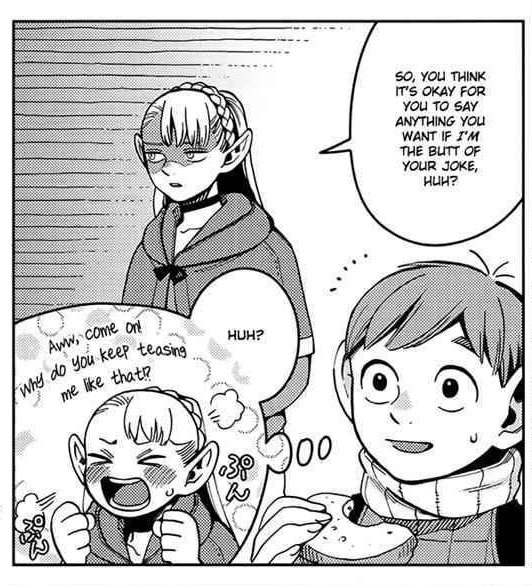
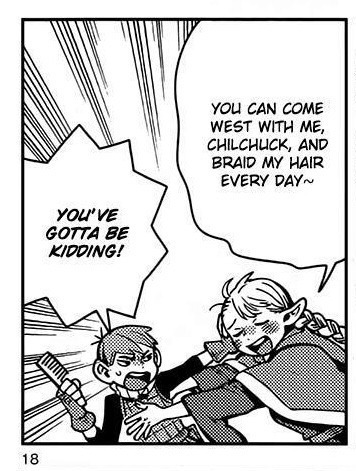
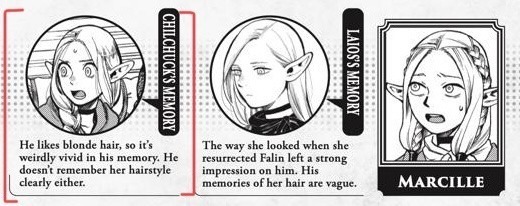
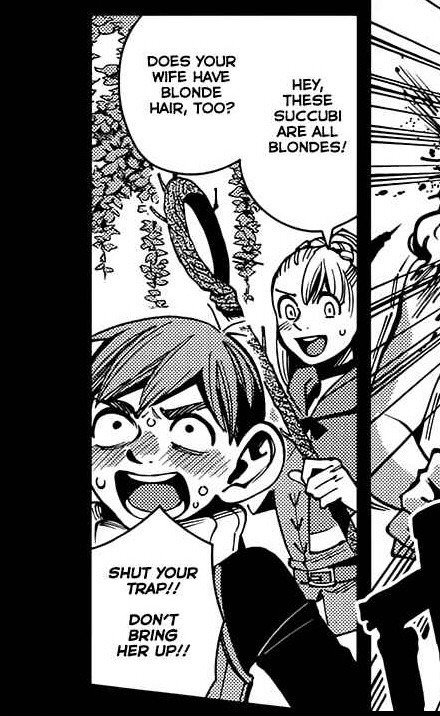
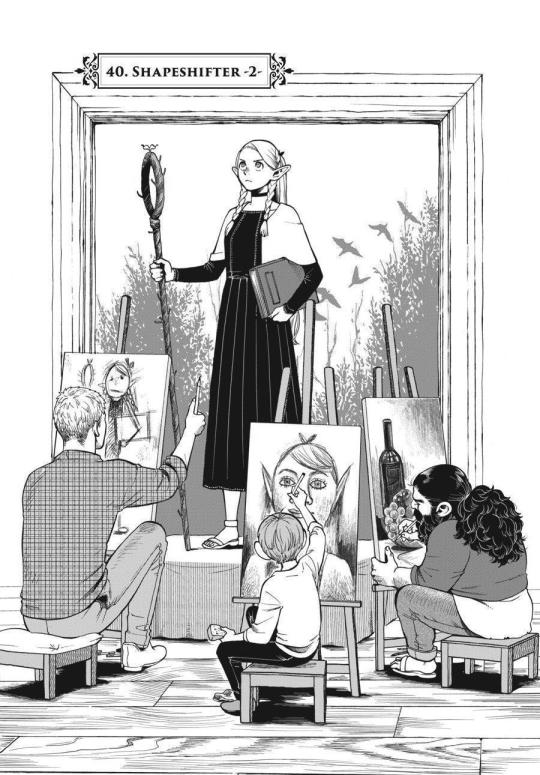
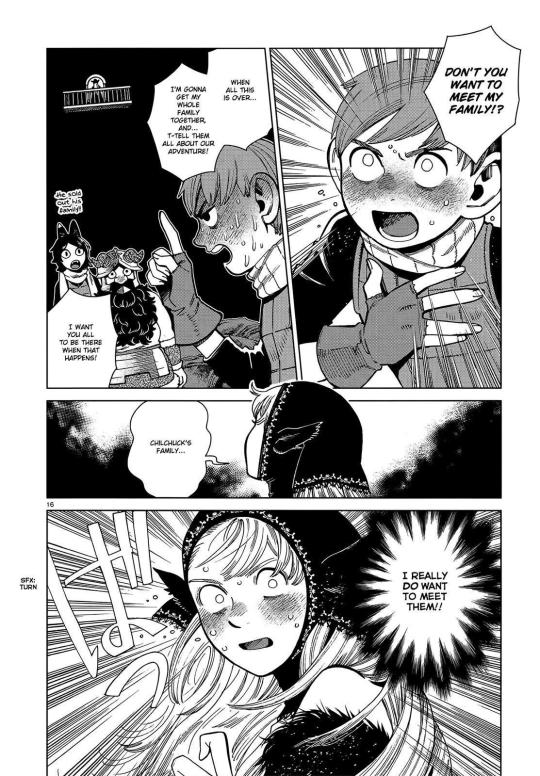
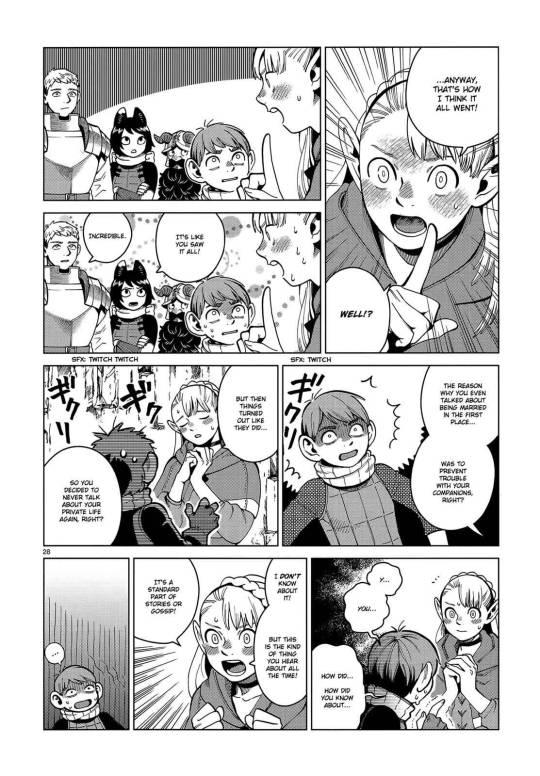
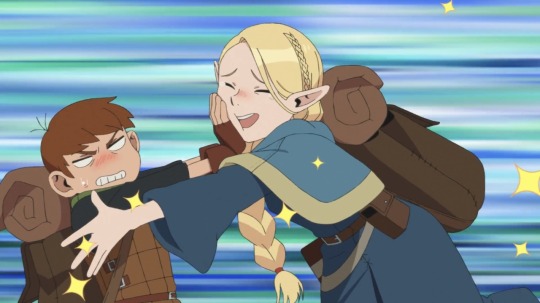
It’s not like they have any thematic narratives or relevance. It’s not like she’ll live to 1000 and has existential dread about it while he’s logically gonna be her next friend to die at 50 and wether it’s romantic or platonic it’ll terrify her to lose him. It’s not like it’s fear of death x fear of rejection so they’re both obsessed with the thought of loss looming, past and ongoing. It’s not like it’s half-elf x half-foot and there’s an inherent journey that was and still is to dispel prejudices and truly come to see each other. It’s not like he’s painfully real and raw and flawed but still a good man, that he’s not the figure of prince charming that she’s always dreamed of while still being virtuous and worth fighting for. Or you know, her hair being golden and it being the epitome of beauty to him, and his hair turning silver and it being Marcille’s worst nightmare.
Just a weird wacky ship who means nothing but shallow things to people who have weirdo reasons for liking it. Like can you not. If you’re not imaginative enough to think of reasons why this ship may have an appealing dynamic that’s not my issue.
But yes, yes, they’re both flat asses to me, thanks.
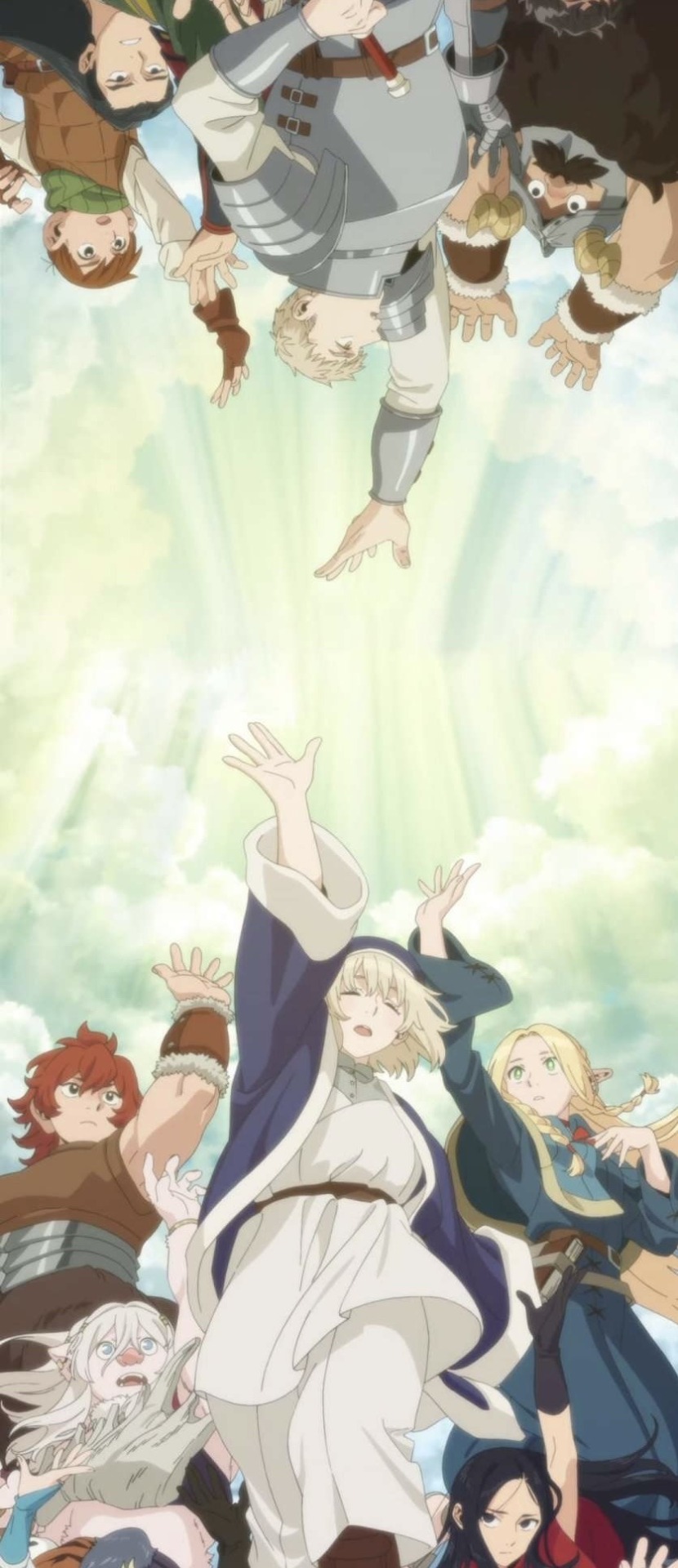
#Dungeon meshi#Ask#Spoilers#dungeon meshi manga spoilers#Marcille donato#chilchuck tims#Marchil#You me the parking lot after i finish and post my arc analysis#Sobbing……… we’re 20 over here in the rarepair pit come on. Like do u not see how obsessed i am. Do u think they like. Mean nothing to me#Do u think it’s all incidental and i slipped and the 10 thousands of words I write for them had no thought or feelings behind them or#Their arc is so beautifuuuuul they come to see each other and her standards become more real while he allows hope and openness#Into his heart again 😭😭 not the way two of their scenes lowkey read as a proposal…#Anyways I hope this makes it clear I’ll fight to my dying breath for them.#I don’t want trouble and i imagine you don’t either so just don’t come shitting on my doorstep#In positive news my fic Grind Me Down Sweetly recently reached 100 likes and 1k hits <3 it can also be read as just platonic so if you like#Them as a duo even as friends give it a shot#Every time I see someone shitting on marchil I start making marchil content faster btw#Not art#Unstoppable force x immovable object my beloved. They need someone stubborn loving methinks. One who loves stubbornly and one who confronts
305 notes
·
View notes
Text
jonelias is incredibly funny and thematically compelling to me because of their character trajectories. like it starts out as twisted nbc hannibal season 1 psychological horror "you wouldn't put a guy in situations" wherein elias runs his lab rat i mean jon through the archivist trauma punch card machine ("wind him up and watch him go") and every day is tortured gothic horror protagonist day for him but he doesn't quite get it yet. and then season 3 happens and jon's a little further in the beholding's grasp and he's experiencing physiological changes which only elias understands and now we're in vampirism metaphor territory, he turned you into a monster but he's the only one who will offer you the absolution you seek! ("elias, am i still human?") murderer mentor maker!!! and you hate him you HATE him but *will graham voice* where else would i go?
and then season 4 happens and audio recording by jonathan sims, the Archivist. point of no return. he's extracting statements. he's feeding. he's unwittingly channelling elias ("you just need... a break.") he's scaring everyone at the institute, but doesn't it feel a tiny bit good after having been powerless and at the mercy of all these other avatars for so long? and even then the only person in the whole world he can turn to for advise is elias because they're alike. they're mirrors. they were similar even before the beholding had its hold on jon, because to be avatars of the eye is to hold a shared, unabating curiosity for knowledge and both of them sought it out to protect themselves from the fears. why else would jon end up at the magnus institute if not for a guest for mr spider.
then there's the panopticon reveal and turns out jon was trapped in a bluebeard narrative all along! but bluebeard's just won. jon took the key and opened the door and found his secret but he's not simply another victim, being bluebeard's final wife means narratively distinguishing yourself from the ones that came before and he does. he's the special one, he's the archive. and jonah/elias says he did everything to free himself from pain and death forever, to free them both from it all forever. and he says "don't worry, jon. you'll get used to it here. in the world that we have made."
and then. power dynamic reversal‼️now season 5 fumbled this badly but listen. the monster you created is coming down to hunt you for sport. the thing you created to escape annihilation is also the very thing that can end you at any given moment. "behold a god more powerful than i who comes to rule over me." and then it's "suffer for me, as i suffered for you." and eventually they play out some equivalent of tackling each other off a cliff hannigram style. or dead ringers 1988. because they're doubles they're mirrors they're shadow selves they're the watcher and the archivist. conjoined. and one cannot exist without the other :)
#this is what your brain looks like on a month of je thoughts#finished tma a month ago and this is so embarrassing like i've never done insane shipposting before!!! when will it end#first time i think i should've made a sideblog... well.#why did i say “incredibly funny”. right. because it makes so much sense that you would think their relationship is central to the podcast#if not 'canon'. but it's not. at all :)#jonelias#tma#jonah/elias#jon/archivist#mine[👁️]
144 notes
·
View notes
Text
Plurality in Slay the Princess: Part 1
[pt: Plurality in Slay the Princess: Part 1]
Imagine you're standing facing the unknown, and then a little internal voice begins narrating everything you see.
[The Narrator] "You're on a path in the woods. And at the end of that path, is a cabin. And in the basement of that cabin, is a princess. You're here to slay her; if you don't, it will be the end of the world."
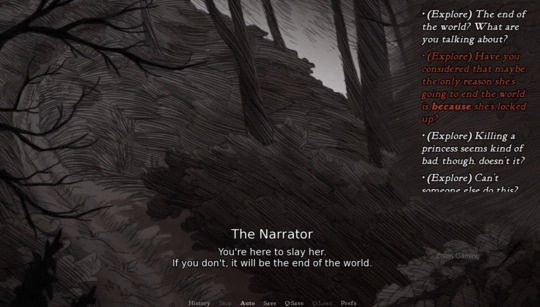
He seems pretty biased.
One of the best indie games to come out in 2023 was Slay the Princess, an indie horror/romance visual novel featuring your player character and the being he's meant to slay, known simply as The Princess. However, you're not alone, in more ways than one- both your player character and the Princess display clear aspects of plurality - aka, multiple identities residing within/utilizing a singular physical body. This can take many forms in real life, from disordered to non-disordered variants, and a good few of them are prominently recognized in this visceral narrative experience.
After the read-more will be some spoilers from the various choices you can make throughout the early game- so while this is part 1, there will be no endgame spoilers yet! It'll start off with Chapter 1 and go deeper from there. If you're intending on playing the game, we HIGHLY recommend you play only after reading Chapter 1 information, or only after this part 1 at most! It's best experienced blind as possible, and trigger warnings are present upon opening the game. This analysis took a while to write, so please consider reblogging if you enjoy!
...
Right from the beginning, the plural undertones of the story are clearly apparent. Once the Narrator stops speaking, you as the one controlling the body are able to communicate by asking various questions directly to the Narrator to press upon, enthuse over, or counter his point. The Narrator is speaking to you mentally, but is not you.
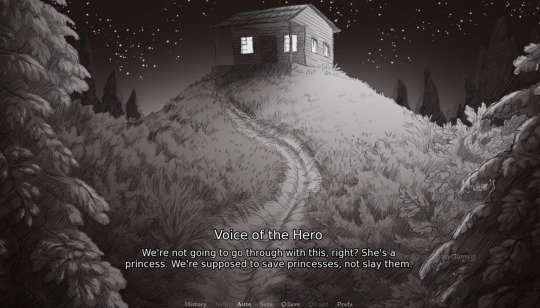
If you continue on the path to the cabin, you're presented with someone else speaking to you internally, titled as "The Voice of the Hero". The Narrator quickly responds with "Ignore him. He doesn't know what he's talking about." This situation tells us a lot of interesting things! First off, the Hero defers to the pronoun "we" - as he's clearly responding to the Narrator's direction, the other individual in this situation must be the controller of the body. The Narrator reinforces this concept by talking directly to you, telling you to ignore the Hero. So right off the bat, there are three people in this body- the Host, whom is being controlled by the player, the Narrator, and the Voice of the Hero. They stay with you throughout (most of) the entire game, so even without much happening, the main character is very blatantly plural. The only thing we can tell about them so far is that they're a polyconscious system, wherein each member displays their own individual consciousnesses rather than sharing one, and can all perceive the world using separate streams of thought.
Let's say you head to the cabin, speak to the Princess, and don't even bother taking the pristine blade meant to slay her, as you're intent on saving her. You speak to her with options using "quotation marks" to indicate vocal speech rather than how you've been thinking to the other members of your system, and you free her from her bindings. Just as you're walking up the stairs, the Narrator decides to try and impose his decision instead, and save the world by using the arm of the body to raise the blade to her. Being in control of the body as a plural/system is called fronting, and oftentimes in intense circumstances, one member can "take" the front from another. This is what we see in the desperate Narrator, and the fact that the Hero expresses his frustration at the Narrator's actions at the same time indicates once again that the members of this system are polyconscious.
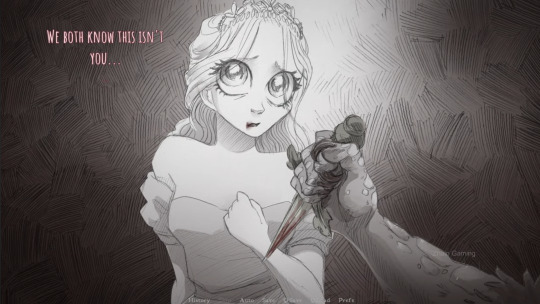
You resist the Narrator and warn the Princess, and she also notices and addresses the sudden shift in motivation. She then takes the blade, and uses it haplessly against you in self defense. Such is this end of Chapter 1; everything goes dark, and you die.
!!! CHAPTER 2+ SPOILERS BEGIN HERE !!!
[pt: !!! Chapter 2+ spoilers begin here !!!]
Chapter 2 is titled "The Damsel". When everything loads, you're back where you were before- the Narrator doesn't seem to remember you or what happened, but you and the Hero clearly do.
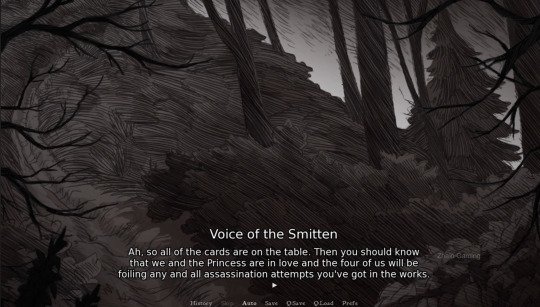
Not only that, but another character has joined the mix since your supposed death- The Voice of the Smitten loudly proclaims his love for the Princess and hatred for the Narrator. Plus, he says something unique- he mentioned "the four of us" foiling the Narrator's "assassination attempts". This four includes the Princess, the Smitten, the Hero, and the Host/player, establishing how everyone here perceives the others as separate entities. Plus, now that naming consistency with the others established, the Narrator, not labeled as a "voice", starts to stand out as something... Different, from the rest of you all.
But it's not just you that's changed; everything within the cabin looks different, and it's not only that.
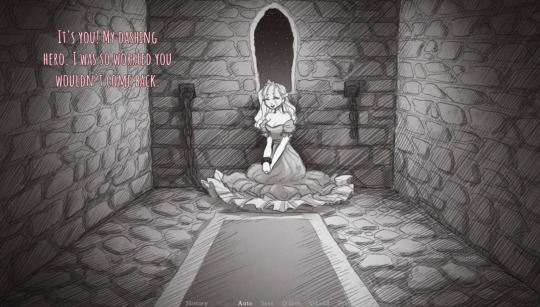
The Princess has metamorphosized; the Damsel wears a new dress and crown, has a much more gentle and delicate disposition, and her voice sounds significantly higher pitched and kinder. Not only that, but her bone structure is physically thinner, as is addressed later in the route. She has inarguably become different in not only personality but appearance too. Additionally, while she recognizes you and your earlier confrontation, she uses the pronoun "I" to refer to both herself as the Damsel and herself as the Princess before. This is indicative of monoconscious systems, where members share an individual consciousness/train of thought and switching involves the feeling of one member "becoming" another in a smooth transition, and median systems, where members often feel like facets of an overarching identity rather than completely separate entities. We see more evidence to medianhood after the two of you escape, and the Damsel seems to be taken away by... Something. You find yourself presented with the Entity holding her gingerly.
"Something finds me in the Long Quiet and brings me the gift of a fragile vessel."
She cradles her and describes the vessels as "nerves and fibers to feel the worlds beyond. Perspectives to make my own", and the Damsel as "soft and delicate. You molded her to love you, and she'll make for a gentle heart." She words it as if they are the same, and yet different at the same time. You ask if she is the Princess, and she says this;
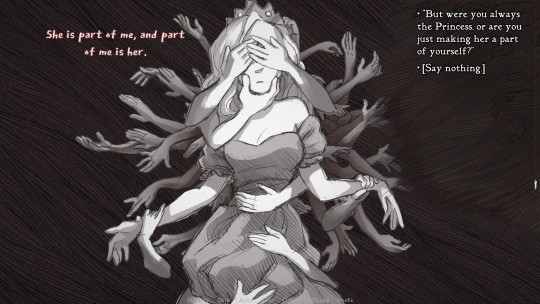
upon pressuring, she states that you're speaking in circles. "Does it matter where one thing begins and another ends?" This once again supports the fluid concept of median plurality. She is different, and yet she is the same. It's hard to tell the lines between one and the other, even though they both still distinctly exist. She asks you to "bring [her] more perspectives so [she] may be whole", wishing for the facets of herself to be returned to her via completing different routes of the game. Interestingly enough, it seems the Entity displays polyconsciousness during these segments, unlike the in-loop Princesses. In another route she mentions the Princess having a will pushing against her own, and at the end of your conversation she mentions one last thing;
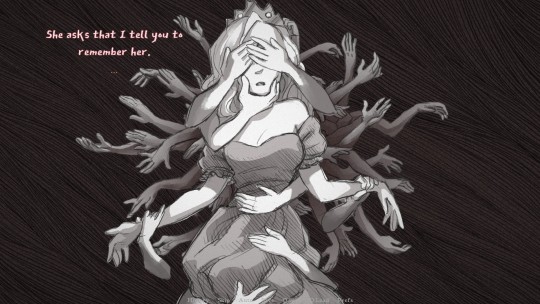
You're flung back to the beginning, with only the Hero and the Narrator at your side, and not a single memory ingame of what happened. You can't re-access old routes, so you have to choose to do something different the next time, to bring different parts of herself home to her.
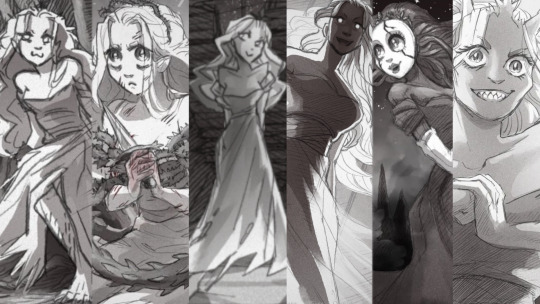
There are many different routes you can end up on, and the Princess will change in many different ways depending on your decisions. Let's go over some interesting notes on how the two's plurality presents over the course of the time loops.
- The Princess seems to be completely monoconscious when within the loops, sometimes acknowledging herself as different but never referring to her other facets as a separate perspective ("I/me", never "she" like the Entity refers to her vessels.) This rule is only broken by the Stranger route whom, where due to the world literally fracturing, had multiple perspectives shoved into a single one, and she refers to herselves as "we".
- The origin of new facets of the Princess seems to correlate directly with the reset of the world they're in, and we never see her looping forms change otherwise, meaning we can likely assume this to be their origin. While time loops aren't recorded to have happened in this universe, we can safely attribute some sort of metagenic origin to the Princess's median facets. The only other time we see her "change" other than after a reset is her disposition & voice upon the first time meeting her, depending on whether or not we take the pristine blade. This displays that the player character's actions directly affect the Princess's facets as well, however delving into that would get into endgame spoilers, so it'll be touched on in part 2.
- Due to the lack of evident amnesia, distress, or disorder expressed to be caused by her plurality (aside from the Stranger) it's safe to assume the Princess falls under the category of systems/plurals without a dissociative disorder such as DID, P-DID, OSDD1, and UDD.
- On the flipside, the Player's system shows quite a lot of distress and disorder, from the Broken and the Smitten attempting to kill the body to the Cold eager to harm it, as well as many different system members with specific jobs meant to help counteract or ease the negative circumstances of the previous loop. Additionally, during the Moment of Clarity chapter, the Host explicitly experiences amnesia of traumatic memories the other members remember everyone experiencing, displaying dissociative amnesia. It's likely this system falls under the category of plurals with a dissociative disorder such as DID, P-DID, OSDD1, and UDD.

- Many speculate the members of the Player character's system to be your past lives or iterations of you after your death, since for the most part, a new one appears every time the body dies. This would be known as a fenigenic/phoenigenic origin. However, there are a couple instances where this theory falls apart- for example, in the No Way Out route, the Player, Hero, Narrator, and Cheated are joined by both the Voice of the Contrarian and the Voice of the Broken at the same time; right after, the Hero states that this is your third time, meaning if the past life theory is true, there should be only two new members, not three. (The line between alive and dead gets fuzzy later in the route, but this one is cut and dry.) Instead, I propose the Player's system to be an adaptive system, ending up with new members whenever they must adapt their mindset drastically to the situation. The new members often tend to be a reflection of the body's actions during the last loop, which supports this concept as well.
- Routes such as No Way Out and The Adversary complicate these assessments. In No Way Out, every time you die you try something different, which results in a new system member every time. In The Adversary, you fight over and over again with the same determination, and The Stubborn remains as the only new member from the beginning the entire time. However, in both of these routes, the Princess stops changing form at all. Evidence once again shows itself that the Player Character's perception not only affects what the Princess will be, but what the results of his own changes will be as well.
- Another differentiation between you, the "voices", and the Narrator, aside from his lack of memory between loops and insistence that he's not the same person as other versions of him, is how they both treat and experience the Mirror. The Narrator is notably distinct in that he cannot see it during regular gameplay, and that once the world is replaced with it at the end of a route, he's no longer existent to perceive it. The ones labeled "voices" are able to see it and fear it instinctively- while they're different from the Narrator, even they disappear when you look in the mirror and speak to the Entity. Hypothetically, this could mean that you are to the Voices' perspectives as the Entity is to the Princess's. The Entity mentions that nothing but you and her come to the space where you speak.
- Upon meeting the Entity after the third time you bring her a vessel, she greets you with this line; "I am a growing chorus of contradiction. A mass of tides ebbing and flowing all at once in more directions than my attention can bear to hold. To look at any one is to shift them all into something new, and to look away is to reshape them yet again. All of me is changing, and yet the rest is still the same." This is an interesting perspective into her relationship with the vessels and how her overarching identity is affected by her medianhood.
- A case that deserves special mentioning is the route of the Spectre, after killing the Princess without hesitation in chapter 1 and then proceeding to kill yourself after. In Chapter 2, you're then presented with the option to let the Spectre possess you temporarily, giving her not only access to your body, but to your mind. For a brief while, she can hear and interact with all the others currently present with you- at the time, the Narrator, the Voice of the Hero, and the Voice of the Cold. Once she's within you, the Narrator can't even get out a full sentence before she comments, "So this is what it's like to be you, huh? Disembodied voice narrating your every move?" She addresses the Voices differently than the Narrator; "All these shards of broken glass on the floor... Are they also supposed to be you?" The Hero takes initial offense at this, saying that "I'm me, is what I am." The conversation continues to the Hero questioning the Narrator's existence, to which he responds, "You don't need to know what I am. You just need to know that I'm different than you. More important."
To this, the Princess answers, "So you're the one that pulled the strings and made me dead. I can tell you don't belong here. You're barely even there. Like the shape of something left behind. You're more of a... Memory, than a person." And then, "You're kind of like me, actually." What does she mean by that? Is he like a ghost? Something else? It'll be addressed in part 2, but clearly he's different from the rest.
- One of the most affirming dialogue options you can have with the Entity is after the fourth time you bring a Vessel to her, where you both speak about how your systems operate. You can ask her, "When you send me back, I'm not alone. There are voices that speak to me. Some of them are me, but one of them is something else. I call him The Narrator, and he wants me to kill you. Do you have a Narrator? Have the Vessels had one?" This is yet another hint that the Narrator is fundamentally different than the rest of the Player's system, making it clear that together they make up a mixed origin system. In response to your question, the Entity responds with this:

From this we get a few things. For one, the Princesses are referred to in the plural sense ("their minds"), enforcing the separation between them. However, she goes on to describe them existing and constantly metamorphosising into something new, basically confirming the concept of monoconsciousness within the Princesses themselves.
....
From all this, we've drawn a lot of conclusions about the plurality of the Player character and the Princess/Entity from Slay the Princess! Such depth of plural experiences is extremely rare in any media, and this one exemplifies it very well, balancing both personhood and parts-based conceptualizations in its depiction. In part 2 we'll go over how the endgame and its philosophy applies to these concepts, as well as the revelations about the characters involved. It's wonderful to have such vibrant and unique plural representation in a video game; thank you for reading this disambiguation!
#slay the princess#stp princess#stp analysis#pluralgang#plural community#plurality#plural system#system community#pluralpunk#plural headcanons#stp the princess#stp the long quiet#stp the hero#the narrator stp#the shifting mound#the long quiet#media analysis#character analysis#slay the princess analysis#adaptive system#monoconscious#mixed origin system#sysmeds dni#exclusionists dni#didosdd#did osdd#disordered system
332 notes
·
View notes